Bachelor's Degree in C-ADE
Business Creation, Administration and Management

Complement your Degree with the Bachelor's Degree in European Business
The Bachelor's Degree in Business Creation, Administration, and Management is built on the pillars of entrepreneurship, creativity, and innovation . To foster these values, the program is led by a faculty of expert professors —leaders in the field of entrepreneurship—who guide students through the challenges of innovation in both large corporations and startups. Students work hands-on and learn through real-life experiences, thanks to a methodology rooted in direct professional engagement.
The offers several entrepreneurship-focused from the very first year, including Fundamentals of Business Creation, Implementation and Launch of New Businesses, and Trends in New Business Financing. These courses encourage students to identify business opportunities and take initiative, sharing their future visions and projects with third parties and potential sponsors.
In addition, the Final Research Project involves the development and implementation of a comprehensive and realistic Business Plan—an essential tool for launching any new venture.
Entrepreneurship is more than just starting a business; it is about launching, managing, and growing a new company. For this reason, students also gain insight into the most important entrepreneurial ecosystems, both nationally and internationally.
Nebrija University, in its commitment to promote its students' international profile, is the only institution that offers, together with the Bachelor's Degree in Business Creation, Administration and Management, the Bachelor's Degree in European Business, which can be taken in Germany.
Read +In addition, our Start-Up Nebrija Center serves as an incubator and accelerator for technology-based business projects. The Entrepreneurs Club and meetings with successful entrepreneurs are some of the initiatives that help us achieve this goal. Over the years, we have assessed and discussed dozens of business creation projects with their founders, several of which have successfully launched and are now operating as viable businesses.
This degree stands out by preparing students in the following fundamental pillars:
- Knowledge of the functional areas of the company
- Special attention to entrepreneurship and internationalization
- Managerial competencies
- Business-specialized English
- Advanced business management computer programs
- Internships in companies
The studies of Business Creation, Administration and Management allow you to successfully start your journey through the exciting world of companies, either as a professional responsible for one of its functional areas or, why not, as manager of your own business project.
To achieve this, we use many elements. In the first place, the classes are participatory, dynamic and interactive, full of practical examples and applications. The case method is often used. You will also visit important companies and institutions such as the Bank of Spain, Bolsas y Mercados Españoles, Thomson Reuters, Santander Financial City, Mercamadrid, among others. On the other hand, you will carry out work internships in a private sector company, in multinationals or in some of the companies of the IBEX 35.
In the Department of Economics and Business Administration we have a special appreciation for entrepreneurs. We like to help our students develop their own business project and put it into operation. The Entrepreneurs Club, the Young Entrepreneurs Award and the meetings with successful entrepreneurs are some of the programs that help us achieve this goal. Over the years, we have discussed and valued with their authors dozens of business creation projects, several of them already underway as viable businesses.
By studying the Degree in Business Creation, Administration and Management with us, you will acquire the knowledge, skills and international experience necessary for your job placement and, if that is what you want, you can develop your business projects with assurance.

Thomson Reuters is the world’s leading source of intelligent information for businesses and professionals.
They combine industry expertise with innovative technology to deliver critical information to leading decision makers in the financial and risk, legal, tax and accounting, intellectual property and science and media markets, powered by the world's most trusted news organization.
Its Financial & Risk business unit provides solutions to the global financial community - delivering critical news, information and analytics, enabling transactions and connecting communities of trading, investing, financial and corporate professionals. They help their customers generate superior returns, improve risk and compliance management, increase access to liquidity and create efficient, reliable infrastructures in increasingly global, electronic and multi-asset class markets, through our market-leading Thomson Reuters Eikon, Thomson Reuters Elektron and Thomson Reuters Accelus.
For further information: http://financial.thomsonreuters.com/en.html
Read LessDouble Degrees, double opportunities Combine your Degree in Business Creation, Administration and Management and obtain a Nebrija NextGen Talent Microcredential
What is the Nebrija NextGen Talent Microcredential?
Starting in the 2026/27 academic year, our Double Degrees will include this qualification, allowing our students to enrich their training and lead in an increasingly globalized world.
It consists of three essential elements:
From the 1st to the 4th year, there will be six work sessions of two and a half hours each, with expert guests from companies, media outlets, agencies, firms, and institutions to address topics such as:
- The most disruptive technological innovations
- New work methods and business models
- Deep Learning, Cognitive Science, Critical Thinking
- Global Affairs, Public Affairs
- New rights in the digital age
- Sustainability, Diversity, 2030 Agenda
Competencies:
- Global vision and critical thinking: abilities to design the future.
- Coherence and entrepreneurship: making the right decisions
- Teamwork and generosity: nurturing personal relationships
These six competencies will be assessed through an online assessment at the beginning of the program, providing each student with a personal development report. Based on that report, we will have two development sessions each year to create and monitor an action plan focusing on two competencies per year.
At the beginning of the fourth year, a new online assessment will allow us to measure each student’s personal improvement. In addition, it will offer guidance on the positions and sectors within the global market that best match their profile.
At the end of the Double Degree, students will participate in a one-week Study Tour at one of the following destinations:
- Montreal (McGill)
- Miami
- Boston (Babson College)
- Hong Kong
- Singapore
- Shanghai
Learn about our 80% Excellence Scholarships for these Double Degrees and benefit from an exclusive Mentoring Program.

This year, Bizum, an instant payments platform promoted by the collaboration of thirty-four Spanish banking entities, joins the many companies that support the School of Economics and Business. This collaboration with Bizum will enrich the educational experience of the students in our Bachelor's Degree in Business Creation and Administration. They will have the opportunity to meet the professionals who have revolutionized the way economic transactions between individuals are conducted in recent years. Additionally, students can visit Bizum's facilities and undertake internships at Redsys, Bizum's parent company, with whom Nebrija University has had a longstanding collaboration.
Nebrija and Elevatorfy: Practical Training in Entrepreneurship
Elevatorfy is an educational platform designed to guide students through the development of their business ideas, offering a structured methodology that covers every step, from idea conception to validation and final presentation. At the Nebrija University Entrepreneurship Club, we have incorporated Elevatorfy into our program to provide students with hands-on training in entrepreneurship.
Methodology and Learning Approach
- Practical learning: Students have access to downloadable tools that support the immediate application of what they have learned.
- Continuous feedback: Ongoing guidance is provided at each stage of the process, helping students improve progressively.
- Inspiration and networking: Students can explore real-world startup examples and connect with a community of entrepreneurs, encouraging the exchange of ideas and experiences.
What Students Work On:
- Identifying opportunities and researching ideas, helping students detect real market needs.
- Validating business ideas through interviews, surveys, and other benchmarking tools with potential users.
- Designing and developing an MVP (Minimum Viable Product) to prototype tangible, functional solutions.
- Preparing their pitch, with a focus on persuasive communication and synthesis skills. Elevatorfy also supports students by enabling them to record and share their presentations in a concise format.
You will complement your Bachelor's Degree with a Diploma in Business Analytics and prepare yourself for the company of the future
Curriculum
BOE Num. 186, of August 2, 2010
Our curriculum has been prepared in accordance with the new guidelines set by current legislation, as if verified by the National Agency for Quality Assessment and Accreditation.
The student must take 240 credits
First year 60 ECTS
First Semester 30 ECTS- 6 ECTS | Company analysis

- 6 ECTS | Fundamentals of economics

- 6 ECTS | Technology applied to business
- 6 ECTS | Mathematics for business
- 6 ECTS | Research skills assessment I

Second Semester 30 ECTS- 6 ECTS | Company and consumer behavior
- 6 ECTS | Financial accounting
- 6 ECTS | Law applied to business I
- 6 ECTS | Financial Mathematics
- 6 ECTS | Fundamentals of business creation

Second year 60 ECTS
First Semester 30 ECTS- 6 ECTS | Advanced English

- 6 ECTS | Advanced financial accounting
- 6 ECTS | Fundamentals of marketing for business

- 6 ECTS | Implementation and launch of new companies
- 6 ECTS | Analysis of the economic environment
Second Semester 30 ECTS- 6 ECTS | Business Management and Organization
- 6 ECTS | Applied statistics
- 6 ECTS | Advanced Business English

- 6 ECTS | Entrepreneurship and innovation management

- 6 ECTS | Research skills assessment II


Third year 60 ECTS
First Semester 30 ECTS- 6 ECTS | Staff and team management
- 6 ECTS | Analytical and management accounting

- 6 ECTS | Economic and financial business diagnosis

- 6 ECTS | Advanced data analysis
- 6 ECTS | Market Research

Second Semester 30 ECTS- 6 ECTS | Company Tax System
- 6 ECTS | Production and services management
- 6 ECTS | Advanced computer management
- 6 ECTS | Elective I
- 6 ECTS | Elective II
The student must take 12 of the 60 Elective ECTS
Fourth year 60 ECTS
First Semester 30 ECTS- 6 ECTS | Leadership and entrepreneurial spirit
- 6 ECTS | Strategic management
- 6 ECTS | Integrated commercial management
- 6 ECTS | Financial management
- 6 ECTS | Research skills assessment III
Second Semester 30 ECTS- 6 ECTS | Planning in new businesses
- 6 ECTS | Internal entrepreneurship
- 6 ECTS | Trends in the financing of new companies
- 6 ECTS | Professional internships
- 6 ECTS | Final Research Project
More info about this subjects
The student must take 12 ECTS in the sixth semester, and may choose from the following subjects, all of them 6 ECTS:
- 6 ECTS | International Business
- 6 ECTS | Law applied to business II
- 6 ECTS | Administration of family business
- 6 ECTS | New companies Internationalization
- 6 ECTS | Financial markets and instruments for the company
- 6 ECTS | Legal aspects for entrepreneurship
- 6 ECTS | Big Data
- 6 ECTS | Business Intelligence
- 6 ECTS |
 Research skills assessment I
Research skills assessment I - 6 ECTS |
 Research skills assessment II
Research skills assessment II - 6 ECTS |
 Research skills assessment III
Research skills assessment III
This program's objective is to favor the practical education of the students, under the continuous supervision of the Department of Professional Careers of the University, the academic department corresponding to the degree and the company or collaborating institution where the internships is carried out. We provide advice on the choice of internship and follow-up and tutoring, always taking into account the professional orientation of each student.
Nebrija University carries out important work to favor the practical training of all its students and the approach to the first employment of the university graduates. All the Business Creation, Administration and Management programs require the completion of at least one internship in companies as an integral part of their curriculum. These internships are chosen according to the professional orientation of each student, which ensures an invaluable real experience, while improving their future professional expectations.
More information on Internship in Companies List of companies and institutions where the students of the degree have had internships under the agreement of educational cooperation.This project involves the student carrying out research tasks and in different subjects with the advice of one or several professors of the Department and, occasionally, professionals from the business world. For this, the student has the possibility to choose a project from among those offered.
Nebrija University, which is committed to languages and quality, provides the student with added value with the Diploma in English Professional Communication, which will allow him/her to achieve with confidence the competence demanded to successfully join the labor market.
It corresponds to level C1.
More information hereAccess to the Degree for Higher Technicians
Professors
| Profesores Professors | Porcentaje de Doctores Percentage of PhD holders |
| 56 | 68% |
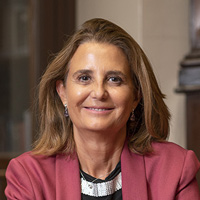 Ana Fernández-Ardavín Martínez
Decana de la Facultad de Economía y Empresa
Ana Fernández-Ardavín Martínez
Decana de la Facultad de Economía y EmpresaDirectora del Departamento de Empresa Dean of the Faculty of Economics and Business
Director of the Business Department Doctor en Ciencias Económicas y Empresariales en la Universidad Complutense de Madrid. Acreditado como profesor contratado doctor. Ha sido Vicerrector de Ordenación Académica, Rector y Decano en varias instituciones académicas nacionales y extranjeras. Ha llevado a cabo la docencia en universidades en grado, posgrado y doctorado, así como en escuelas de negocio. En la empresa privada ha desarrollado diferentes cargos en el Crédit Commercial de France, KPMG e Iverban SVB. Actualmente imparte docencia en la Universidad Nebrija en la cual es decana de la Facultad de Economía y Empresa
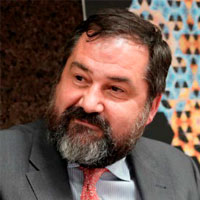 José María Peláez Marqués
Director del Grado en ADE
Director of Bachelor's Degree in Business Creation, Administration and Management
Licenciado en Filología Clásica por la Universidad Complutense y Doctor en la misma ciencia por la Universidad Autónoma con una tesis sobre la vigencia del modelo de liderazgo del héroe clásico. Completa esta formación humanística con dos postgrados en Dirección de Empresa: MBA por el Instituto de Empresa y Executive MBA por el IESE.
Como profesor visitante de Humanidades y Liderazgo ha colaborado con Universidades extranjeras como las de Notre Dame y Loyola en EE.UU, con la Universidad Autónoma de México, la Aarhus University en Dinamarca, la Fundación Universidad de América en Colombia, la Universidad de La Haya y la Universitá Europea y el Campus Biomédico en Roma.
Con anterioridad a su actividad docente, ha desempeñado durante más de 15 años el puesto de Director de Recursos Humanos en diferentes multinacionales como Fujitsu SIEMENS, LG Electronics y AXA Seguros.
Sus líneas de investigación son la vigencia de los estudios del Mundo Clásico y su aplicación en estudios de Empresa así como la Sostenibilidad aplicada a la gestión de RRHH. https://www.linkedin.com/in/josemariapelaezmarques/
José María Peláez Marqués
Director del Grado en ADE
Director of Bachelor's Degree in Business Creation, Administration and Management
Licenciado en Filología Clásica por la Universidad Complutense y Doctor en la misma ciencia por la Universidad Autónoma con una tesis sobre la vigencia del modelo de liderazgo del héroe clásico. Completa esta formación humanística con dos postgrados en Dirección de Empresa: MBA por el Instituto de Empresa y Executive MBA por el IESE.
Como profesor visitante de Humanidades y Liderazgo ha colaborado con Universidades extranjeras como las de Notre Dame y Loyola en EE.UU, con la Universidad Autónoma de México, la Aarhus University en Dinamarca, la Fundación Universidad de América en Colombia, la Universidad de La Haya y la Universitá Europea y el Campus Biomédico en Roma.
Con anterioridad a su actividad docente, ha desempeñado durante más de 15 años el puesto de Director de Recursos Humanos en diferentes multinacionales como Fujitsu SIEMENS, LG Electronics y AXA Seguros.
Sus líneas de investigación son la vigencia de los estudios del Mundo Clásico y su aplicación en estudios de Empresa así como la Sostenibilidad aplicada a la gestión de RRHH. https://www.linkedin.com/in/josemariapelaezmarques/
 Santiago Budria Rodriguez
IP y profesor Análisis Avanzado de Datos
IP and professor Advanced Data Analysis
Licenciado en economía por la Universidad Pompeu Fabra, y Doctor en Economía por la Universidad de Alicante. Con más de 1000 citaciones en Google Scholar y más de 20 artículos en revistas JCR, ha colaborado en una docena de proyectos de investigación competitivos y consultoría. Sus áreas de interés son la microeconometría, el mercado de trabajo, la economía de la educación, la desigualdad y el bienestar.
Santiago Budria Rodriguez
IP y profesor Análisis Avanzado de Datos
IP and professor Advanced Data Analysis
Licenciado en economía por la Universidad Pompeu Fabra, y Doctor en Economía por la Universidad de Alicante. Con más de 1000 citaciones en Google Scholar y más de 20 artículos en revistas JCR, ha colaborado en una docena de proyectos de investigación competitivos y consultoría. Sus áreas de interés son la microeconometría, el mercado de trabajo, la economía de la educación, la desigualdad y el bienestar.
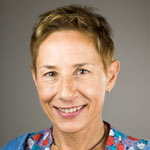 Ivana Ambrosio Racic
Profesora
Professor
Doctora en Ciencias Empresariales por la Universidad Nebrija. Máster Universitario en Creación y Dirección de Empresas por la Universidad Nebrija. Licenciada en Ciencias Económicas y Empresariales por la Universidad Complutense de Madrid, rama de Economía de la Empresa, especialidad en Contabilidad y Auditoría. También Diplomada por la Universidad Complutense de Madrid en Ciencias Empresariales, especialidad en Contabilidad. Cursos de Doctorado en la UCM en el programa de Contabilidad y Auditoría. Profesora del área de Contabilidad de la Universidad Antonio de Nebrija. Ha sido profesora asociada en IE University y en la Universidad Carlos III de Madrid. También profesora y colaboradora en la CECO-ICEX, Nebrija Business School, Fundación COSO, AEDE Business School.
Ivana Ambrosio Racic
Profesora
Professor
Doctora en Ciencias Empresariales por la Universidad Nebrija. Máster Universitario en Creación y Dirección de Empresas por la Universidad Nebrija. Licenciada en Ciencias Económicas y Empresariales por la Universidad Complutense de Madrid, rama de Economía de la Empresa, especialidad en Contabilidad y Auditoría. También Diplomada por la Universidad Complutense de Madrid en Ciencias Empresariales, especialidad en Contabilidad. Cursos de Doctorado en la UCM en el programa de Contabilidad y Auditoría. Profesora del área de Contabilidad de la Universidad Antonio de Nebrija. Ha sido profesora asociada en IE University y en la Universidad Carlos III de Madrid. También profesora y colaboradora en la CECO-ICEX, Nebrija Business School, Fundación COSO, AEDE Business School.
 Óscar Aguado Tevar
Profesor
Professor
El Director Gerente de la Universidad Nebrija, Óscar Aguado, es ingeniero de Minas y doctor por la Universidad Politécnica de Madrid, con la tesis “Análisis de la estructura de la oferta/demanda y rentabilidad esperada en el sector de la distribución minorista de carburantes mediante la evaluación de emplazamientos” (2016). Posee además una Licenciatura en Administración y Dirección de Empresas por la Escuela de Negocios HEC-París, y con dos másteres en Economía de la Energía por el Instituto Francés del Petróleo y la Universidad de Oklahoma.
Óscar cuenta también con una amplia experiencia universitaria. Es docente desde 2016 y adicionalmente a la docencia que imparte actualmente en Nebrija, es responsable de los módulos de Economía en el Master's degree in Oil & Gas Engineering (MIP) y en el Curso de Experto en Ingeniería y Usos del Gas ante la Transición Energética (gasTE) de la ETSI de Minas y Energía (UPM). Además, ha impartido asignaturas financieras en diversos programas de CUNEF (Máster en Finanzas - MUIMF, Master in International Business and Global Management, Programa Ejecutivo Dirección Financiera, Programa Ejecutivo en Finanzas Internacionales, formación in Company…), y ha dirigido una quincena de TFMs. Además de participar en el Gobierno de Nebrija a través de sus diferentes Consejos (Gestión, Gobierno, Dirección... entre otros), ha estado involucrado en Política y Gestión Universitaria, y ha desempeñado varios cargos unipersonales y de representación en órganos colegiados tanto en CUNEF Universidad (miembro de la Comisión de Participación constituyente) como en la UPM (Consejo Social, Claustro, Consejo/Junta de Gobierno, Junta de Escuela...), y participado en paneles de acreditación como ABET o EFMD/ENQHEEI. Anteriormente había trabajado en BBVA, entidad en la que ha desarrollado su carrera durante 16 años: 9 en Estrategia y Desarrollo de Negocio de la división de gestión de activos (AM&GW) y 7 en banca mayorista en el ámbito energético (como analista de bolsa de empresas petroleras, realizando fusiones y adquisiciones, o como analista de riesgos de compañías de hidrocarburos).
Óscar Aguado Tevar
Profesor
Professor
El Director Gerente de la Universidad Nebrija, Óscar Aguado, es ingeniero de Minas y doctor por la Universidad Politécnica de Madrid, con la tesis “Análisis de la estructura de la oferta/demanda y rentabilidad esperada en el sector de la distribución minorista de carburantes mediante la evaluación de emplazamientos” (2016). Posee además una Licenciatura en Administración y Dirección de Empresas por la Escuela de Negocios HEC-París, y con dos másteres en Economía de la Energía por el Instituto Francés del Petróleo y la Universidad de Oklahoma.
Óscar cuenta también con una amplia experiencia universitaria. Es docente desde 2016 y adicionalmente a la docencia que imparte actualmente en Nebrija, es responsable de los módulos de Economía en el Master's degree in Oil & Gas Engineering (MIP) y en el Curso de Experto en Ingeniería y Usos del Gas ante la Transición Energética (gasTE) de la ETSI de Minas y Energía (UPM). Además, ha impartido asignaturas financieras en diversos programas de CUNEF (Máster en Finanzas - MUIMF, Master in International Business and Global Management, Programa Ejecutivo Dirección Financiera, Programa Ejecutivo en Finanzas Internacionales, formación in Company…), y ha dirigido una quincena de TFMs. Además de participar en el Gobierno de Nebrija a través de sus diferentes Consejos (Gestión, Gobierno, Dirección... entre otros), ha estado involucrado en Política y Gestión Universitaria, y ha desempeñado varios cargos unipersonales y de representación en órganos colegiados tanto en CUNEF Universidad (miembro de la Comisión de Participación constituyente) como en la UPM (Consejo Social, Claustro, Consejo/Junta de Gobierno, Junta de Escuela...), y participado en paneles de acreditación como ABET o EFMD/ENQHEEI. Anteriormente había trabajado en BBVA, entidad en la que ha desarrollado su carrera durante 16 años: 9 en Estrategia y Desarrollo de Negocio de la división de gestión de activos (AM&GW) y 7 en banca mayorista en el ámbito energético (como analista de bolsa de empresas petroleras, realizando fusiones y adquisiciones, o como analista de riesgos de compañías de hidrocarburos).
 María Cristina Aguirre
Profesora
Professor
María Cristina Aguirre
Profesora
Professor
 Manuel Alvarez Sáez
Profesor
Professor
Licenciado en Ciencias Económicas y Empresariales- Especialidad Dirección Comercial- Universidad del Pais Vaco
Master Universitario en Investigación de Dirección de Empresas, Marketing y Contabilidad (IDEMCON) – Universidad Complutense de Madrid, 2016
Doctorado en ADE (en curso), Universidad Complutense de Madrid. Tesis doctoral sobre el impacto de Big Data en las decisiones estratégicas
Certificado ATE – Academic Teaching Excellence – British Council, 2015
Diploma de excelencia docente, “Docentia”, Universidad Complutense, 2017
Profesional con 32 años de experiencia trabajando en áreas de Tecnología empresarial como ERP, HICM, CRM y Comercio Electrónico en empresas fabricantes de software como Sage, Meta4, SAP, Oracle, etc. y líneas de investigación Herramientas de Productividad para el sector Turístico.Big Data y sus modelos de negocio en empresas privadas e instituciones públicas.
Participa en varios grupos de investigación sobre el fenómeno “Big Data”.
Manuel Alvarez Sáez
Profesor
Professor
Licenciado en Ciencias Económicas y Empresariales- Especialidad Dirección Comercial- Universidad del Pais Vaco
Master Universitario en Investigación de Dirección de Empresas, Marketing y Contabilidad (IDEMCON) – Universidad Complutense de Madrid, 2016
Doctorado en ADE (en curso), Universidad Complutense de Madrid. Tesis doctoral sobre el impacto de Big Data en las decisiones estratégicas
Certificado ATE – Academic Teaching Excellence – British Council, 2015
Diploma de excelencia docente, “Docentia”, Universidad Complutense, 2017
Profesional con 32 años de experiencia trabajando en áreas de Tecnología empresarial como ERP, HICM, CRM y Comercio Electrónico en empresas fabricantes de software como Sage, Meta4, SAP, Oracle, etc. y líneas de investigación Herramientas de Productividad para el sector Turístico.Big Data y sus modelos de negocio en empresas privadas e instituciones públicas.
Participa en varios grupos de investigación sobre el fenómeno “Big Data”.
 Ana Asensio Ciria
Profesora
Professor
Licenciada en Derecho por la Universidad de Valladolid y Doctora en Economía por la Universidad de Córdoba. Máster en Formación del Profesorado (especialización en Formación y Orientación Laboral) por la Universidad Complutense y postgrado en la Escuela de Práctica Jurídica de la Universidad Complutense. Ex-opositora a Inspección de Hacienda del Estado. Abogada colegiada en ICAM (n. 91665).
Mi trayectoria profesional abarca más de 24 años de experiencia en diversos campos en firmas de auditoría financiera, asesoramiento integral a emprendedores, consultoría empresarial, ejercicio de la abogacía en las ramas mercantil, fiscal y laboral y en el ámbito del Emprendimiento y la Innovación. Como ponente y formadora, he impartido seminarios y cursos en numerosas empresas y organizaciones, abordando temas jurídicos, económicos, financieros y de estrategia empresarial. Mi experiencia docente incluye colaboraciones con escuelas de negocios y Universidades, donde he desarrollado programas formativos especializados en emprendimiento y gestión empresarial.
Desde hace más de 12 años desempeño el cargo de directora de Viveros de empresas en la red de Viveros de Empresas Madrid Emprende (Ayuntamiento de Madrid), habiendo gestionado sucesivamente los viveros de San Blas-Canillejas, Vicálvaro y actualmente el vivero de empresas de Puente de Vallecas. Paralelamente, soy responsable desde hace 4 años del programa de aceleración de empresas tecnológicas innovadoras (Spinout), liderando la selección y mentorización de startups tecnológicas para llevar proyectos de la Universidad al mercado y miembro del equipo de investigación responsable del ranking de viveros y aceleradoras de empresas de Funcas "Los servicios que prestan los viveros y aceleradoras de empresas en España", que actualmente se encuentra en su undécima edición y se ha convertido en referente nacional en el ecosistema emprendedor.
Mi compromiso con el emprendimiento y la innovación se refleja también en mi participación activa como mentora en diversos programas de emprendimiento, como el programa de mentores de la Fundación Madri+D donde soy mentora con Certificación Business Mentor; la Fundación Human age, mentorizando programas de emprendimiento juvenil y la Asociación española de Mentoring (AMCES) entre otros; colaboradora con medios de comunicación de economía y negocios e investigadora con artículos publicados en revistas científicas en temas de Emprendimiento e Innovación y en particular relacionados con las Business Incubators.
Ana Asensio Ciria
Profesora
Professor
Licenciada en Derecho por la Universidad de Valladolid y Doctora en Economía por la Universidad de Córdoba. Máster en Formación del Profesorado (especialización en Formación y Orientación Laboral) por la Universidad Complutense y postgrado en la Escuela de Práctica Jurídica de la Universidad Complutense. Ex-opositora a Inspección de Hacienda del Estado. Abogada colegiada en ICAM (n. 91665).
Mi trayectoria profesional abarca más de 24 años de experiencia en diversos campos en firmas de auditoría financiera, asesoramiento integral a emprendedores, consultoría empresarial, ejercicio de la abogacía en las ramas mercantil, fiscal y laboral y en el ámbito del Emprendimiento y la Innovación. Como ponente y formadora, he impartido seminarios y cursos en numerosas empresas y organizaciones, abordando temas jurídicos, económicos, financieros y de estrategia empresarial. Mi experiencia docente incluye colaboraciones con escuelas de negocios y Universidades, donde he desarrollado programas formativos especializados en emprendimiento y gestión empresarial.
Desde hace más de 12 años desempeño el cargo de directora de Viveros de empresas en la red de Viveros de Empresas Madrid Emprende (Ayuntamiento de Madrid), habiendo gestionado sucesivamente los viveros de San Blas-Canillejas, Vicálvaro y actualmente el vivero de empresas de Puente de Vallecas. Paralelamente, soy responsable desde hace 4 años del programa de aceleración de empresas tecnológicas innovadoras (Spinout), liderando la selección y mentorización de startups tecnológicas para llevar proyectos de la Universidad al mercado y miembro del equipo de investigación responsable del ranking de viveros y aceleradoras de empresas de Funcas "Los servicios que prestan los viveros y aceleradoras de empresas en España", que actualmente se encuentra en su undécima edición y se ha convertido en referente nacional en el ecosistema emprendedor.
Mi compromiso con el emprendimiento y la innovación se refleja también en mi participación activa como mentora en diversos programas de emprendimiento, como el programa de mentores de la Fundación Madri+D donde soy mentora con Certificación Business Mentor; la Fundación Human age, mentorizando programas de emprendimiento juvenil y la Asociación española de Mentoring (AMCES) entre otros; colaboradora con medios de comunicación de economía y negocios e investigadora con artículos publicados en revistas científicas en temas de Emprendimiento e Innovación y en particular relacionados con las Business Incubators.
 Francisco Avendaño
Profesor
Professor
Profesor de Gestión del Emprendimiento y de la Innovación y Emprendimiento Interno en el Doble Grado en Economía y Creación, Administración y Dirección de Empresas (CADE) en Universidad Antonio de Nebrija. Francisco es Doctor en Derecho por la Universidad de Castilla-La Mancha. Su especialidad investigadora se centra en la transformación digital del mercado de trabajo, los nuevos modelos de negocio y en la integración de la Inteligencia Artificial en la docencia universitaria. Combina su labor docente con una dilatada experiencia profesional directiva en el ámbito de los recursos humanos, la organización y las relaciones laborales en multinacionales (Unión Fenosa-Naturgy, PriceWaterhouseCoopers, Andersen Consulting) y en la representación empresarial nacional e internacional (Director Adjunto de Relaciones Laborales de CEOE 1994-2000 y 2009-2012; vocal y portavoz en numerosas comisiones tripartitas del Ministerio de Trabajo, Consejo Económico y Social, OIT, etc.). Autor del libro Capitalismo y Modelos de Negocio en la Revolución Digital y Mercado de Trabajo (UCLM-Dykinson, 2023) y coautor de numerosas publicaciones científicas y de divulgación sobre empleo, negociación colectiva y digitalización de las organizaciones.
Francisco Avendaño
Profesor
Professor
Profesor de Gestión del Emprendimiento y de la Innovación y Emprendimiento Interno en el Doble Grado en Economía y Creación, Administración y Dirección de Empresas (CADE) en Universidad Antonio de Nebrija. Francisco es Doctor en Derecho por la Universidad de Castilla-La Mancha. Su especialidad investigadora se centra en la transformación digital del mercado de trabajo, los nuevos modelos de negocio y en la integración de la Inteligencia Artificial en la docencia universitaria. Combina su labor docente con una dilatada experiencia profesional directiva en el ámbito de los recursos humanos, la organización y las relaciones laborales en multinacionales (Unión Fenosa-Naturgy, PriceWaterhouseCoopers, Andersen Consulting) y en la representación empresarial nacional e internacional (Director Adjunto de Relaciones Laborales de CEOE 1994-2000 y 2009-2012; vocal y portavoz en numerosas comisiones tripartitas del Ministerio de Trabajo, Consejo Económico y Social, OIT, etc.). Autor del libro Capitalismo y Modelos de Negocio en la Revolución Digital y Mercado de Trabajo (UCLM-Dykinson, 2023) y coautor de numerosas publicaciones científicas y de divulgación sobre empleo, negociación colectiva y digitalización de las organizaciones.
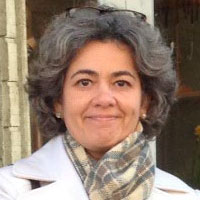 María Rita Blanco
Profesora
Professor
Es profesora en la Universidad Nebrija, habiendo impartido clases de grado y posgrado -previamente- en la Universidad Rey Juan Carlos, Madrid, así como en universidades en Argentina. Profesor Contratado Doctor, cuenta con sexenio vivo desde 2024. Sus áreas de interés en investigación son gestión del talento y carreras. Su experiencia profesional incluye, también, haber trabajado en Recursos Humanos durante más de veinte años, en roles nacionales y regionales. Es Doctora en Administración de Empresas de la Universidad Complutense de Madrid (España), Master en Relaciones Industriales y Recursos Humanos de London School of Economics (Inglaterra) y Licenciada en Administración de Empresas y Contadora Pública de la Universidad Católica Argentina (Argentina).
María Rita Blanco
Profesora
Professor
Es profesora en la Universidad Nebrija, habiendo impartido clases de grado y posgrado -previamente- en la Universidad Rey Juan Carlos, Madrid, así como en universidades en Argentina. Profesor Contratado Doctor, cuenta con sexenio vivo desde 2024. Sus áreas de interés en investigación son gestión del talento y carreras. Su experiencia profesional incluye, también, haber trabajado en Recursos Humanos durante más de veinte años, en roles nacionales y regionales. Es Doctora en Administración de Empresas de la Universidad Complutense de Madrid (España), Master en Relaciones Industriales y Recursos Humanos de London School of Economics (Inglaterra) y Licenciada en Administración de Empresas y Contadora Pública de la Universidad Católica Argentina (Argentina).
 Oscar Blanquer
Profesor
Professor
Licenciado en CC. Económicas y Empresariales y por la Universidad Autónoma de Madrid. Adicionalmente ha cursado el Programa de Desarrollo Directivo en el IESE, y cursos de gestión financiera y de Marketing en Universidad de Berkeley.
Oscar Blanquer
Profesor
Professor
Licenciado en CC. Económicas y Empresariales y por la Universidad Autónoma de Madrid. Adicionalmente ha cursado el Programa de Desarrollo Directivo en el IESE, y cursos de gestión financiera y de Marketing en Universidad de Berkeley.
Actualmente estudiando el Master de Humanidades de la UFV.
En la faceta académica es profesor asociado en el área de ventas en el IE y anteriormente en ESRP.
Cuenta con más de 20 años de experiencia de gestión y directiva en multinacionales como IBM, Indra, Diageo o General Mills.
 Olga Butenko Nesterenko
Profesora
Professor
Máster en Banca y Finanzas por la Universidad de Birmingham (1996) y máster en Economía por la University of the State of New York & Central European University (1994). Además, cursó el Global Senior Management Program de The University of Chicago Booth School of Business & Instituto de Empresa (2009) y el programa “Economic Restructuring Policy” en el Harvard Institute for International Development (1995). En 1991 se graduó en Física, con mención de honor, en la Kyiv State Universtity. En la actualidad es miembro del consejo de administración de Evolot Holding. En el pasado fue vicepresidenta de Alfa Capital Partners (2006-2008), directora de la división de banca de inversión en Ucrania de Alfa Group (2003-2006), vicepresidente y co-gestora de fondos en Foyil Asset Management (1997-2002) y economista del Harvard Institute for International Development en el grupo para la reforma económica en Ucrania (1996-1997).
Olga Butenko Nesterenko
Profesora
Professor
Máster en Banca y Finanzas por la Universidad de Birmingham (1996) y máster en Economía por la University of the State of New York & Central European University (1994). Además, cursó el Global Senior Management Program de The University of Chicago Booth School of Business & Instituto de Empresa (2009) y el programa “Economic Restructuring Policy” en el Harvard Institute for International Development (1995). En 1991 se graduó en Física, con mención de honor, en la Kyiv State Universtity. En la actualidad es miembro del consejo de administración de Evolot Holding. En el pasado fue vicepresidenta de Alfa Capital Partners (2006-2008), directora de la división de banca de inversión en Ucrania de Alfa Group (2003-2006), vicepresidente y co-gestora de fondos en Foyil Asset Management (1997-2002) y economista del Harvard Institute for International Development en el grupo para la reforma económica en Ucrania (1996-1997).
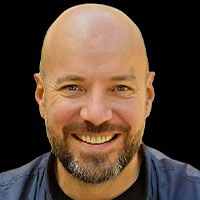 Leonel Antonio Cerno
Profesor
Professor
Doctor en Economía por la Universidad Complutense de Madrid (año 2006). Miembro del Cuerpo Superior de Estadísticos del Estado (año 2008). Fue profesor a tiempo completo entre 2001 y 2008, desarrollando tareas de docencia e investigación en la Universidad Europea de Madrid, y en la Universidad Carlos III.
Fue encargado de proyecto en el Instituto Nacional de Estadística (2009-2010), consejero técnico en el Ministerio de Industria y Comercio (2010-2011), jefe de investigación en el Instituto de Estudios Fiscales (2011-2016) Entre 2016 y 2019 fue Experto Nacional Destacado en Eurostat (Oficina Estadística de la Comisión Europea, Luxemburgo).
Regresó a España en 2019 donde desempeñó tareas en la DG de Análisis Macroeconómico del Ministerio de Economía (2019 - 2021) Entre 2021 y 2022 se desempeñó como consejero técnico en la Unidad Administradora del Fondo Social Europeo, dependiente del Ministerio de Trabajo. Actualmente desempeña tareas en la elaboración, ejecución y evaluación del Presupuesto en la Oficina Presupuestaria del Ministerio de Agricultura, Pesca y Alimentación.
Leonel Antonio Cerno
Profesor
Professor
Doctor en Economía por la Universidad Complutense de Madrid (año 2006). Miembro del Cuerpo Superior de Estadísticos del Estado (año 2008). Fue profesor a tiempo completo entre 2001 y 2008, desarrollando tareas de docencia e investigación en la Universidad Europea de Madrid, y en la Universidad Carlos III.
Fue encargado de proyecto en el Instituto Nacional de Estadística (2009-2010), consejero técnico en el Ministerio de Industria y Comercio (2010-2011), jefe de investigación en el Instituto de Estudios Fiscales (2011-2016) Entre 2016 y 2019 fue Experto Nacional Destacado en Eurostat (Oficina Estadística de la Comisión Europea, Luxemburgo).
Regresó a España en 2019 donde desempeñó tareas en la DG de Análisis Macroeconómico del Ministerio de Economía (2019 - 2021) Entre 2021 y 2022 se desempeñó como consejero técnico en la Unidad Administradora del Fondo Social Europeo, dependiente del Ministerio de Trabajo. Actualmente desempeña tareas en la elaboración, ejecución y evaluación del Presupuesto en la Oficina Presupuestaria del Ministerio de Agricultura, Pesca y Alimentación.
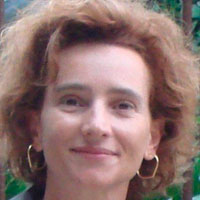 Isabel de Cabanyes Treviño
Profesora
Professor
Ejecutiva con más de 15 años de experiencia en desarrollo de negocio, expansión comercial y gestión de grandes cuentas a nivel nacional e internacional. Experta en apertura de mercados, creación y dirección de equipos y establecimiento de canales de venta, liderando proyectos de prospección, negociación y fidelización de clientes clave, así como el lanzamiento y consolidación de marcas en Europa. Experiencia relevante como Directora Comercial y Country Manager de marcas icónicas internacionales así como Responsable de Relaciones Institucionales y Donantes Estratégicos en CIMA (Centro de Investigación médica Aplicada de la Universidad de Navarra). Docente de Fashion Business Management en el IED y de Análisis de Empresa y Prospección de Mercado en la Universidad de Nebrija; Licenciada en Derecho y Máster en Dirección Retail en el Instituto de Empresa (IE).
Isabel de Cabanyes Treviño
Profesora
Professor
Ejecutiva con más de 15 años de experiencia en desarrollo de negocio, expansión comercial y gestión de grandes cuentas a nivel nacional e internacional. Experta en apertura de mercados, creación y dirección de equipos y establecimiento de canales de venta, liderando proyectos de prospección, negociación y fidelización de clientes clave, así como el lanzamiento y consolidación de marcas en Europa. Experiencia relevante como Directora Comercial y Country Manager de marcas icónicas internacionales así como Responsable de Relaciones Institucionales y Donantes Estratégicos en CIMA (Centro de Investigación médica Aplicada de la Universidad de Navarra). Docente de Fashion Business Management en el IED y de Análisis de Empresa y Prospección de Mercado en la Universidad de Nebrija; Licenciada en Derecho y Máster en Dirección Retail en el Instituto de Empresa (IE).
 Cristina Díaz Piñas
Profesora
Professor
Graduada en Derecho por la Universidad Complutense de Madrid. Máster en Acceso a la Abogacía con Diploma en Derecho Corporativo Internacional en CUNEF.
Después de haber sido Abogada en BBVA, se dedica exclusivamente a la docencia universitaria, siendo, además, doctoranda.
Autora colaboradora de varios manuales de Derecho, entre los que destacan el manual de Derecho Procesal “La Justicia digital en España y la Unión Europea”, donde redactó la investigación sobre “Las nuevas tecnologías en la audiencia y la exploración del menor en el proceso civil”, editorial ATELIER, (2019).
Colabora también en las Monografías de la editorial jurídica Sepín, destacando el Artículo Monográfico: “Las actuaciones en el ámbito educativo previstas en la Ley Orgánica 1/2004 de Medidas de Protección Integral contra la Violencia de Género como modelo comunitario e internacional”.
Cristina Díaz Piñas
Profesora
Professor
Graduada en Derecho por la Universidad Complutense de Madrid. Máster en Acceso a la Abogacía con Diploma en Derecho Corporativo Internacional en CUNEF.
Después de haber sido Abogada en BBVA, se dedica exclusivamente a la docencia universitaria, siendo, además, doctoranda.
Autora colaboradora de varios manuales de Derecho, entre los que destacan el manual de Derecho Procesal “La Justicia digital en España y la Unión Europea”, donde redactó la investigación sobre “Las nuevas tecnologías en la audiencia y la exploración del menor en el proceso civil”, editorial ATELIER, (2019).
Colabora también en las Monografías de la editorial jurídica Sepín, destacando el Artículo Monográfico: “Las actuaciones en el ámbito educativo previstas en la Ley Orgánica 1/2004 de Medidas de Protección Integral contra la Violencia de Género como modelo comunitario e internacional”.
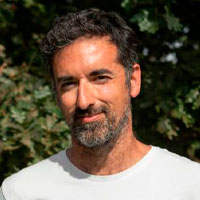 Carlos Antonio Chaves Gonzalez
Profesor
Professor
Consultor de marketing digital con doce años de experiencia en política europea asesorando a empresas como Coca-Cola, UPS, Roche, Bayer...; a instituciones como la Comisión Europea o Naciones Unidas y a partidos políticos como el Partido Popular Europeo. Con experiencia en McCann Erickson y Johnson Wax, dejó las multinacionales para constituir su primera empresa en tecnología para publicidad y DOOH, creando productos pioneros en España y que le valieron trece premios a la innovación, de los cuales dos fueron a nivel nacional. Ha estudiado A.D.E. y Literatura creativa, complementándolo con un Máster en Publicidad (ICADE) y un Diploma Internacional en Diseño y Planificación de Campañas electorales (Instituto Ortega y Gasset). También posee un Diploma de Estudios Avanzados en Biología Molecular y Genética por la Universidad Complutense de Madrid y actualmente está cursando un doctorado en el campo de la Neurología.
Entre sus publicaciones destaca "Y si te pido que me entierres", un libro totalmente biodegradable que fue creado para plantarse y concebir flores después de ser leído.
Carlos Antonio Chaves Gonzalez
Profesor
Professor
Consultor de marketing digital con doce años de experiencia en política europea asesorando a empresas como Coca-Cola, UPS, Roche, Bayer...; a instituciones como la Comisión Europea o Naciones Unidas y a partidos políticos como el Partido Popular Europeo. Con experiencia en McCann Erickson y Johnson Wax, dejó las multinacionales para constituir su primera empresa en tecnología para publicidad y DOOH, creando productos pioneros en España y que le valieron trece premios a la innovación, de los cuales dos fueron a nivel nacional. Ha estudiado A.D.E. y Literatura creativa, complementándolo con un Máster en Publicidad (ICADE) y un Diploma Internacional en Diseño y Planificación de Campañas electorales (Instituto Ortega y Gasset). También posee un Diploma de Estudios Avanzados en Biología Molecular y Genética por la Universidad Complutense de Madrid y actualmente está cursando un doctorado en el campo de la Neurología.
Entre sus publicaciones destaca "Y si te pido que me entierres", un libro totalmente biodegradable que fue creado para plantarse y concebir flores después de ser leído.
 David Cohén Wahnón
Profesor
Professor
Doctor Ingeniero Agrónomo por la Universidad Politécnica de Madrid - Departamento de Economía y Ciencias Sociales Agrarias (ETSIA). Diplomado en Alta Dirección de Empresas (PADE) por el IESE (Universidad de Navarra). Experiencia Profesional, siempre en puestos de Alta Dirección, en: Creación, Reflotamiento, Reestructuración, Gestión y Organización de Empresas (internacionales y nacionales). Sectores: Agroalimentario (Bebidas, Transferencia de Tecnología, Cárnico, Distribución Mayorista), Multimedia (Información Especializada), Consultoría Estratégica Internacional. Experiencia Académica: Profesor Universidad Antonio de Nebrija, Facultad de Economía y Empresa, Postgrado y Executive Education (presencial y online): Dirección Estratégica, Estrategia Empresarial, Análisis Estratégico para la Toma de Decisiones, Diagnóstico, Evaluación y Elección de la Estrategia, Metodología para Elaborar e Implementar un Plan Estratégico, Metodología para Proyectos de Internacionalización Empresarial (productos o servicios), Aprovechamiento de Oportunidades Empresariales, Oportunidades de Negocio Globales, Estrategia Competitiva y Gestión del Cambio, Análisis del Entorno Internacional y Definición de la Estrategia Corporativa. Publicaciones, Ponencias, Seminarios y Mesas Redondas: amplias y numerosas, relacionadas siempre con mis áreas de Experiencia Profesional y Académica.
David Cohén Wahnón
Profesor
Professor
Doctor Ingeniero Agrónomo por la Universidad Politécnica de Madrid - Departamento de Economía y Ciencias Sociales Agrarias (ETSIA). Diplomado en Alta Dirección de Empresas (PADE) por el IESE (Universidad de Navarra). Experiencia Profesional, siempre en puestos de Alta Dirección, en: Creación, Reflotamiento, Reestructuración, Gestión y Organización de Empresas (internacionales y nacionales). Sectores: Agroalimentario (Bebidas, Transferencia de Tecnología, Cárnico, Distribución Mayorista), Multimedia (Información Especializada), Consultoría Estratégica Internacional. Experiencia Académica: Profesor Universidad Antonio de Nebrija, Facultad de Economía y Empresa, Postgrado y Executive Education (presencial y online): Dirección Estratégica, Estrategia Empresarial, Análisis Estratégico para la Toma de Decisiones, Diagnóstico, Evaluación y Elección de la Estrategia, Metodología para Elaborar e Implementar un Plan Estratégico, Metodología para Proyectos de Internacionalización Empresarial (productos o servicios), Aprovechamiento de Oportunidades Empresariales, Oportunidades de Negocio Globales, Estrategia Competitiva y Gestión del Cambio, Análisis del Entorno Internacional y Definición de la Estrategia Corporativa. Publicaciones, Ponencias, Seminarios y Mesas Redondas: amplias y numerosas, relacionadas siempre con mis áreas de Experiencia Profesional y Académica.
 Jorge Colvin Diez
Profesor
Professor
Doctor en Administración y Dirección de Empresas por la Universidad Antonio de Nebrija. Diplomado en Dirección de Empresas (PDD) por el IESE (Universidad de Navarra). Master en Bolsa y Mercados Financieros por el IEB (Instituto de Estudios Bursátiles). En su vertiente académica, además de ser profesor de la Universidad de Nebrija en Dirección Financiera, Contabilidad Financiera y Diseño y Gestión de Planes de Negocio, actualmente es profesor del área de Finanzas y Contabilidad en la Universidad americana Schiller International University (SIU), en la Universidad Francisco de Vitoria y en Centro Universitario de Villanueva. En su faceta como investigador, ha desarrollado tanto diversas colaboraciones académicas con el IESE como publicaciones en revistas científicas indexadas. Cuenta con más de 15 años de experiencia profesional en empresas líderes en su sector como PricewaterhouseCoopers, KPMG y Grupo Codere, siendo está última en la que fue responsable de fusiones y adquisiciones para España y miembro de Gabinete de Presidencia. Actualmente es business angel en el IESE y asesor de Presidencia a empresas multinacionales españolas así como de varios bancos de inversión en operaciones de fusiones y adquisiciones.
Jorge Colvin Diez
Profesor
Professor
Doctor en Administración y Dirección de Empresas por la Universidad Antonio de Nebrija. Diplomado en Dirección de Empresas (PDD) por el IESE (Universidad de Navarra). Master en Bolsa y Mercados Financieros por el IEB (Instituto de Estudios Bursátiles). En su vertiente académica, además de ser profesor de la Universidad de Nebrija en Dirección Financiera, Contabilidad Financiera y Diseño y Gestión de Planes de Negocio, actualmente es profesor del área de Finanzas y Contabilidad en la Universidad americana Schiller International University (SIU), en la Universidad Francisco de Vitoria y en Centro Universitario de Villanueva. En su faceta como investigador, ha desarrollado tanto diversas colaboraciones académicas con el IESE como publicaciones en revistas científicas indexadas. Cuenta con más de 15 años de experiencia profesional en empresas líderes en su sector como PricewaterhouseCoopers, KPMG y Grupo Codere, siendo está última en la que fue responsable de fusiones y adquisiciones para España y miembro de Gabinete de Presidencia. Actualmente es business angel en el IESE y asesor de Presidencia a empresas multinacionales españolas así como de varios bancos de inversión en operaciones de fusiones y adquisiciones.
 Víctor Conde Salazar
Profesor
Professor
Dr. Economía y Administración de Empresas – Internacionalización de empresas (UNNE). Máster en Gestión Comercial y Marketing (ESIC). Licenciado en Ciencias Empresariales (UCM).
Víctor Conde Salazar
Profesor
Professor
Dr. Economía y Administración de Empresas – Internacionalización de empresas (UNNE). Máster en Gestión Comercial y Marketing (ESIC). Licenciado en Ciencias Empresariales (UCM). Desde 1993 profesor en varias Universidades (Complutense, Nebrija, Salamanca, EAN de Colombia, TEC de Monterrey) y Escuelas de Negocio (ESIC, EAE, Nebrija, ESPM Brasil), tanto en España como en el extranjero. Ha sido coordinador del grado en ADE y y director de programas máster relacionados con emprendimiento, comercial y marketing. Actualmente, coordinador del Club de Emprendedores Nebrija. Desde 1977 ha desarrollado su actividad profesional en varias empresas multinacionales y españolas, con responsabilidades en el área de marketing, comercial, dirección general y consultoría. Actualmente es director general de la Asociación de Marketing de España. Dos de sus logros más significativos son el lanzamiento del diario El Mundo como director gerente de Unidad Editorial y el éxito de afluencia a la EXPO´92 de Sevilla, como director de marketing.
 Eduardo Correa Lázaro
Profesor
Professor
Especialista en Marketing y gestión de Comercial enfocado al cliente.
Licenciado en Gestión Comercial y Marketing, MBA Executive y Titulado Superior en Dirección Comercial por ESIC Business & MarketingSchool. Eduardo es también Graduado en Marketing y Máster en Dirección de Comunicación y Nuevas Tecnologías por la Universidad Rey Juan Carlos de Madrid. Actualmente es Doctorando en la Facultad de Ciencias de la Información de la Universidad Complutense de Madrid. Profesionalmente ha realizado su carrera en importantes compañías como ADT -Operador Logístico-, ESIC Business & Marketing School o Diario El País, entre otros, ocupando cargos de responsabilidad directiva. Desde hace 20 años, compagina su actividad profesional con la docencia en Universidades como UCM -Universidad Complutense de Madrid-, de la que es profesor asociado del departamento de Comercialización e Investigación de Mercados, o prestigiosas Escuelas de Negocios tales como EAE Business School, UNIR Business School, ESIC Business & Marketing School, UFV-Adem o IMF entre otras. Actualmente desarrolla su actividad profesional como consultor para Ephemeral Life, compañía dedicada a la Consultoría, Gestión y Formación.
Eduardo Correa Lázaro
Profesor
Professor
Especialista en Marketing y gestión de Comercial enfocado al cliente.
Licenciado en Gestión Comercial y Marketing, MBA Executive y Titulado Superior en Dirección Comercial por ESIC Business & MarketingSchool. Eduardo es también Graduado en Marketing y Máster en Dirección de Comunicación y Nuevas Tecnologías por la Universidad Rey Juan Carlos de Madrid. Actualmente es Doctorando en la Facultad de Ciencias de la Información de la Universidad Complutense de Madrid. Profesionalmente ha realizado su carrera en importantes compañías como ADT -Operador Logístico-, ESIC Business & Marketing School o Diario El País, entre otros, ocupando cargos de responsabilidad directiva. Desde hace 20 años, compagina su actividad profesional con la docencia en Universidades como UCM -Universidad Complutense de Madrid-, de la que es profesor asociado del departamento de Comercialización e Investigación de Mercados, o prestigiosas Escuelas de Negocios tales como EAE Business School, UNIR Business School, ESIC Business & Marketing School, UFV-Adem o IMF entre otras. Actualmente desarrolla su actividad profesional como consultor para Ephemeral Life, compañía dedicada a la Consultoría, Gestión y Formación.
 Lisardo de Pedro Navarro
Profesor
Professor
Cerca de 20 años de experiencia en departamentos de marketing, en empresas de gran consumo; Colgate, Ediciones SM, Grupo SOS, siendo su última posición International Marketing Manager en Deoleo. Ocupando siempre posiciones de línea de Producto ha sido responsable de las decisiones de las variables del marketing Mix de los productos de su responsabilidad en marcas como Cuétara, Arroz SOS, Carbonell, Koipe, Barco de Vapor. Formador desde el año 1998, habiendo participado en la elaboración y desarrollo de diferentes programas de postgrado en la universidad de IBM, así como en la implantación de programas de formación en empresas como Gimnasios Go Fit, Heineken, vinculado a universidades y escuelas de Negocio, impartiendo asignaturas de Marketing. Doctor en Ciencias económicas y sociales Departamento de Economía de Empresa por la universidad Rey Juan Carlos. Bachelor en Business Administration por la universidad de Humershide. Licenciado en Gestión comercial y Marketing por ESIC. Master Gestión comercial y marketing (GESCO) oficial por ESIC y la universidad Rey Juan Carlos. Master en Dirección Financiera (MDF) por ESIC.
Lisardo de Pedro Navarro
Profesor
Professor
Cerca de 20 años de experiencia en departamentos de marketing, en empresas de gran consumo; Colgate, Ediciones SM, Grupo SOS, siendo su última posición International Marketing Manager en Deoleo. Ocupando siempre posiciones de línea de Producto ha sido responsable de las decisiones de las variables del marketing Mix de los productos de su responsabilidad en marcas como Cuétara, Arroz SOS, Carbonell, Koipe, Barco de Vapor. Formador desde el año 1998, habiendo participado en la elaboración y desarrollo de diferentes programas de postgrado en la universidad de IBM, así como en la implantación de programas de formación en empresas como Gimnasios Go Fit, Heineken, vinculado a universidades y escuelas de Negocio, impartiendo asignaturas de Marketing. Doctor en Ciencias económicas y sociales Departamento de Economía de Empresa por la universidad Rey Juan Carlos. Bachelor en Business Administration por la universidad de Humershide. Licenciado en Gestión comercial y Marketing por ESIC. Master Gestión comercial y marketing (GESCO) oficial por ESIC y la universidad Rey Juan Carlos. Master en Dirección Financiera (MDF) por ESIC.
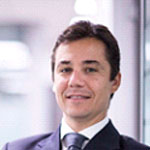 Alberto Fernández Carnicero
Profesor
Professor
Licenciado en Administración y Dirección de Empresas por la Universidad Complutense de Madrid, especializado en el área de Finanzas. Master en Bolsa y Mercados Financieros por el IEB (Instituto de Estudios Bursátiles). Master en Gestión de entidades aseguradoras por ICEA. Programa Ejecutivo de Seguro Internacional en el centro de Swiss RE en Zurich. En su faceta académica, además de ser profesor de la universidad de Nebrija en Instituciones y mercados financieros internacionales y Matemáticas Financieras, actualmente es profesor en el área de finanzas de la escuela Garigues, en ICEA, en la escuela Next International Businees y en la EAE Business School. Cuenta con 20 años de experiencia profesional en el mundo de la gestión de activos y fondos de inversión en Mutuactivos SGIIC(entidad de gestión de activos financieros del Grupo Mutua Madrileña), desarrollando actividades relacionada con la gestión fundamental de carteras en renta variable global y valoración de compañías a través del análisis detallado de la información financiera y formando parte del comité de inversiones.
Alberto Fernández Carnicero
Profesor
Professor
Licenciado en Administración y Dirección de Empresas por la Universidad Complutense de Madrid, especializado en el área de Finanzas. Master en Bolsa y Mercados Financieros por el IEB (Instituto de Estudios Bursátiles). Master en Gestión de entidades aseguradoras por ICEA. Programa Ejecutivo de Seguro Internacional en el centro de Swiss RE en Zurich. En su faceta académica, además de ser profesor de la universidad de Nebrija en Instituciones y mercados financieros internacionales y Matemáticas Financieras, actualmente es profesor en el área de finanzas de la escuela Garigues, en ICEA, en la escuela Next International Businees y en la EAE Business School. Cuenta con 20 años de experiencia profesional en el mundo de la gestión de activos y fondos de inversión en Mutuactivos SGIIC(entidad de gestión de activos financieros del Grupo Mutua Madrileña), desarrollando actividades relacionada con la gestión fundamental de carteras en renta variable global y valoración de compañías a través del análisis detallado de la información financiera y formando parte del comité de inversiones.
 Virginia Fernández Fernández
Profesora
Professor
Es especialista en Responsabilidad Social Corporativa (RSC) y Gestión del Impacto Social, con una sólida trayectoria en consultoría de sostenibilidad empresarial para empresas del IBEX 35 en sectors como el energético y financiero, así como en proyectos de medición de impacto con entidades del ámbito empresarial y no lucrativo.
Su formación en Ciencias Políticas y Administración Pública (Universidad Complutense de Madrid), complementada con un Máster en Gestión y Medición del Impacto Social (Universidad Pontificia de Comillas) y un Máster en Gestión de Proyectos, Políticas Públicas y Cooperación Internacional. Su trayectoria académica también incluye formación internacional en la Universidad de Utrecht (Países Bajos) e Irlanda. Actualmente, es Profesora de RSC y Negocio Responsable en la Universidad de Nebrija, además de haber impartido formación en la Universidad Pontificia de Comillas.
Virginia Fernández Fernández
Profesora
Professor
Es especialista en Responsabilidad Social Corporativa (RSC) y Gestión del Impacto Social, con una sólida trayectoria en consultoría de sostenibilidad empresarial para empresas del IBEX 35 en sectors como el energético y financiero, así como en proyectos de medición de impacto con entidades del ámbito empresarial y no lucrativo.
Su formación en Ciencias Políticas y Administración Pública (Universidad Complutense de Madrid), complementada con un Máster en Gestión y Medición del Impacto Social (Universidad Pontificia de Comillas) y un Máster en Gestión de Proyectos, Políticas Públicas y Cooperación Internacional. Su trayectoria académica también incluye formación internacional en la Universidad de Utrecht (Países Bajos) e Irlanda. Actualmente, es Profesora de RSC y Negocio Responsable en la Universidad de Nebrija, además de haber impartido formación en la Universidad Pontificia de Comillas.
 Raquel García-Donas Guerrero
Profesora
Professor
Graduada en Turismo por la Universidad de Alcalá. Máster en Formación del profesorado, especialidad en Administración de Empresas y Economía, por la Universidad Rey Juan Carlos. Postgrado en Enseñanza de las Ciencias Sociales por la Universidad Isabel I. Complementos de formación en Administración y Dirección de Empresas por la UNED. Habilitación lingüística en Inglés para profesores bilingües de la Comunidad de Madrid. Experiencia docente impartiendo asignaturas del ámbito socioeconómico, tales como Economía, Iniciativa empresarial, Contabilidad financiera, Matemáticas aplicadas y Ciencias sociales.Coordinación de diversos programas educativos como Banco de Herramientas de la Fundación Educación Responsable, 4º+EMPRESA o ACCEDE. Cursos de especialización en G-Suite, Apple Teacher, Formación de formadores y dinamización de aulas virtuales. Participación en el I Congreso de Turismo Networking organizado por la Facultad de Ciencias Económicas y Empresariales de la UAH. Trayectoria investigadora en Flipped Classroom, recursos tecnológicos y nuevas metodologías docentes. Proyecto de investigación actual: estudio de la destrucción de empleo en el sector bancario español.
Raquel García-Donas Guerrero
Profesora
Professor
Graduada en Turismo por la Universidad de Alcalá. Máster en Formación del profesorado, especialidad en Administración de Empresas y Economía, por la Universidad Rey Juan Carlos. Postgrado en Enseñanza de las Ciencias Sociales por la Universidad Isabel I. Complementos de formación en Administración y Dirección de Empresas por la UNED. Habilitación lingüística en Inglés para profesores bilingües de la Comunidad de Madrid. Experiencia docente impartiendo asignaturas del ámbito socioeconómico, tales como Economía, Iniciativa empresarial, Contabilidad financiera, Matemáticas aplicadas y Ciencias sociales.Coordinación de diversos programas educativos como Banco de Herramientas de la Fundación Educación Responsable, 4º+EMPRESA o ACCEDE. Cursos de especialización en G-Suite, Apple Teacher, Formación de formadores y dinamización de aulas virtuales. Participación en el I Congreso de Turismo Networking organizado por la Facultad de Ciencias Económicas y Empresariales de la UAH. Trayectoria investigadora en Flipped Classroom, recursos tecnológicos y nuevas metodologías docentes. Proyecto de investigación actual: estudio de la destrucción de empleo en el sector bancario español.
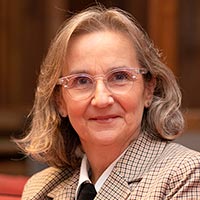 Mónica Goded Salto
Profesora
Professor
Es doctora en Economía por la Universidad Complutense de Madrid y licenciada en Administración y Dirección de Empresas por la Universidad Pontificia Comillas - ICADE.
Mónica Goded Salto
Profesora
Professor
Es doctora en Economía por la Universidad Complutense de Madrid y licenciada en Administración y Dirección de Empresas por la Universidad Pontificia Comillas - ICADE.
Desde 1987 ha realizado labores docentes e investigadoras, tanto en grado como en postgrado, en la Universidad San Pablo CEU; en la Universidad de Deusto; en la UNIR y en la Universidad Pontificia Comillas - ICADE. Actualmente es miembro del claustro de la Universidad Nebrija en la que dirige el Departamento de Economía y el Grado en Economía y Negocios Internacionales. Cuenta con la acreditación de la ACAP en las figuras de Profesor Contratado Doctor y Profesor Doctor de Universidad Privada. Es autora de diversas publicaciones científicas en el ámbito de la Economía Internacional y el Desarrollo. Ha colaborado en diferentes medios de divulgación y es evaluadora externa en revistas de su ámbito de especialización. Ha participado en varios proyectos de investigación financiados por la Secretaría de Estado para la Cooperación Internacional y para Iberoamérica; la Comunidad de Madrid; el Ayuntamiento de Madrid; la Dirección de Cooperación del Gobierno Vasco y el Ministerio de Ciencia e Innovación.
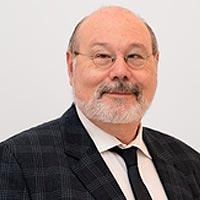 Emilio José González González
Profesor
Professor
Licenciado en Ciencias Económicas y Empresariales por la UNED y doctor en Economía por la Universidad Autónoma de Madrid.
Siguió los cursos de Managerial Economics and Business Analysis de la University of Illinois at Urbana-Champaign y de Programación y Políticas Financieras I y II del Fondo Monetario Internacional. También asistió al Workshop of International Economics en el Real Colegio Complutense at Harvard University, con beca de la Fundación Rafael del Pino.
Cuenta con una amplia experiencia docente en las más prestigiosas universidades españolas, como la Universidad Autónoma de Madrid o Icade, en esta última hasta agosto de 2024. Además, ha sido mentor del programa de formación de jóvenes emprendedores Citizen Bootcamp en Deusto Business School.
En el ámbito profesional, ha sido periodista económico, trabajando en medios como Expansión, Época y Gaceta de los Negocios, en los que ocupó cargos directivos, y ha colaborado con COPE, Capital Radio, Intereconomía y EsRadio. Es, o ha sido, asesor de instituciones como el Círculo de Empresarios y la Fundación Rafael del Pino, entre otras. Cuenta con diversas publicaciones, tanto de investigación como de innovación docente.
Emilio José González González
Profesor
Professor
Licenciado en Ciencias Económicas y Empresariales por la UNED y doctor en Economía por la Universidad Autónoma de Madrid.
Siguió los cursos de Managerial Economics and Business Analysis de la University of Illinois at Urbana-Champaign y de Programación y Políticas Financieras I y II del Fondo Monetario Internacional. También asistió al Workshop of International Economics en el Real Colegio Complutense at Harvard University, con beca de la Fundación Rafael del Pino.
Cuenta con una amplia experiencia docente en las más prestigiosas universidades españolas, como la Universidad Autónoma de Madrid o Icade, en esta última hasta agosto de 2024. Además, ha sido mentor del programa de formación de jóvenes emprendedores Citizen Bootcamp en Deusto Business School.
En el ámbito profesional, ha sido periodista económico, trabajando en medios como Expansión, Época y Gaceta de los Negocios, en los que ocupó cargos directivos, y ha colaborado con COPE, Capital Radio, Intereconomía y EsRadio. Es, o ha sido, asesor de instituciones como el Círculo de Empresarios y la Fundación Rafael del Pino, entre otras. Cuenta con diversas publicaciones, tanto de investigación como de innovación docente.
 Oscar Pablo Gutierrez León
Profesor
Professor
Licenciado en Ciencias Económicas y Empresariales: Economía General por la Universidad Complutense de Madrid. Es miembro aprobado en Reino Unido por la Financia! Conduct Authority (FCA) como "Financia! Broker" y como "lnvestment Advisor" aprobado por la Securities and Exchange Commission (SEC) en EE.UU. Ha desarrollado su carrera profesional en las áreas de Mercados de Capitales en diversos bancos de inversión e Inversión Institucional . Ha desempeñado diversas funciones en el área de mercados en instituciones financieras como AB Margan Stanley, JP Margan, Saloman Brothers, ABN Amro, La Caixa, Banco Santander y Alantra y en el área de Inversión Institucional en Banco Santander y Sienna lnvestment Managers.
Oscar Pablo Gutierrez León
Profesor
Professor
Licenciado en Ciencias Económicas y Empresariales: Economía General por la Universidad Complutense de Madrid. Es miembro aprobado en Reino Unido por la Financia! Conduct Authority (FCA) como "Financia! Broker" y como "lnvestment Advisor" aprobado por la Securities and Exchange Commission (SEC) en EE.UU. Ha desarrollado su carrera profesional en las áreas de Mercados de Capitales en diversos bancos de inversión e Inversión Institucional . Ha desempeñado diversas funciones en el área de mercados en instituciones financieras como AB Margan Stanley, JP Margan, Saloman Brothers, ABN Amro, La Caixa, Banco Santander y Alantra y en el área de Inversión Institucional en Banco Santander y Sienna lnvestment Managers.
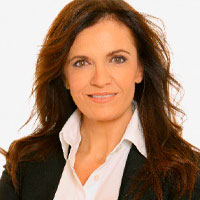 Adela Herranz Luna
Profesora
Professor
Licenciada en Ciencias Económicas y Empresariales por la Universidad Pontifica de Comillas (ICADE) su formación incluye seminarios de management en INSEAD. Es profesora de grado y postgrado en áreas como marketing estratégico y operativo, gestión de marca y relaciones públicas, así como ponente en programas MBA. Profesional con más de treinta años de experiencia en gestión, marketing y retail en los sectores de lujo y cosmética, con una trayectoria directiva en una multinacional líder, donde ocupó puestos como Dirección General de marcas de lujo y de la División de Productos Profesionales en distintos mercados internacionales liderado estrategias de marca, desarrollo comercial, expansión retail y proyectos de transformación empresarial. Es socia fundadora de una empresa dedicada a soluciones digitales para retail, donde ha impulsado proyectos de consultoría, desarrollo tecnológico y crecimiento de marca. También ejerce como asesora de nuevos negocios y en dirección de transición en varios proyectos.
Adela Herranz Luna
Profesora
Professor
Licenciada en Ciencias Económicas y Empresariales por la Universidad Pontifica de Comillas (ICADE) su formación incluye seminarios de management en INSEAD. Es profesora de grado y postgrado en áreas como marketing estratégico y operativo, gestión de marca y relaciones públicas, así como ponente en programas MBA. Profesional con más de treinta años de experiencia en gestión, marketing y retail en los sectores de lujo y cosmética, con una trayectoria directiva en una multinacional líder, donde ocupó puestos como Dirección General de marcas de lujo y de la División de Productos Profesionales en distintos mercados internacionales liderado estrategias de marca, desarrollo comercial, expansión retail y proyectos de transformación empresarial. Es socia fundadora de una empresa dedicada a soluciones digitales para retail, donde ha impulsado proyectos de consultoría, desarrollo tecnológico y crecimiento de marca. También ejerce como asesora de nuevos negocios y en dirección de transición en varios proyectos.
 Eva María Iglesias Guzmán
Profesora
Professor
Licenciada en Biología por la Universidad Complutense de Madrid. Especialidad Ambiental. Técnico Superior en Prevención de Riesgos Laborales (3 Especialidades: Higiene Industrial, Seguridad en el Trabajo y Ergonomía y Psicosociología Aplicada). Máster Oficial en Responsabilidad Corporativa. Directora Académica del Máster Universitario en Liderazgo y Dirección de Recursos Humanos de la Universidad Antonio de Nebrija. Y Profesora Universitaria de Máster Oficiales de Sistemas Integrados de Gestión y de Prevención de Riesgos Laborales con acreditada experiencia en varias Universidades. Experta en Sistemas Integrados de Gestión – HSEQ (Healthy Safety Environmental and Quality), en Gestión Ambiental Sostenible, Responsabilidad Corporativa, Calidad y Prevención de Riesgos Laborales. Auditora de Sistemas Integrados de Gestión (ISO 9001, ISO 14001, OHSAS 18001, ISO 22000). Directora de Departamento Académico de PRL, Sistemas Integrados de Gestión y Medio Ambiente con 15 profesores a su cargo y personal de administración y servicios, y un volumen anual de más de 600 alumnos sólo de máster oficial. Es miembro del Congreso Nacional de Medio Ambiente (CONAMA) 2008, 2010, 2016 y 2018 y del Congreso de la Sociedad Española de Salud y Seguridad en el Trabajo (SESST), 2017 y 2018. Y del II Congreso Internacional de Prevencionar (2019).
Eva María Iglesias Guzmán
Profesora
Professor
Licenciada en Biología por la Universidad Complutense de Madrid. Especialidad Ambiental. Técnico Superior en Prevención de Riesgos Laborales (3 Especialidades: Higiene Industrial, Seguridad en el Trabajo y Ergonomía y Psicosociología Aplicada). Máster Oficial en Responsabilidad Corporativa. Directora Académica del Máster Universitario en Liderazgo y Dirección de Recursos Humanos de la Universidad Antonio de Nebrija. Y Profesora Universitaria de Máster Oficiales de Sistemas Integrados de Gestión y de Prevención de Riesgos Laborales con acreditada experiencia en varias Universidades. Experta en Sistemas Integrados de Gestión – HSEQ (Healthy Safety Environmental and Quality), en Gestión Ambiental Sostenible, Responsabilidad Corporativa, Calidad y Prevención de Riesgos Laborales. Auditora de Sistemas Integrados de Gestión (ISO 9001, ISO 14001, OHSAS 18001, ISO 22000). Directora de Departamento Académico de PRL, Sistemas Integrados de Gestión y Medio Ambiente con 15 profesores a su cargo y personal de administración y servicios, y un volumen anual de más de 600 alumnos sólo de máster oficial. Es miembro del Congreso Nacional de Medio Ambiente (CONAMA) 2008, 2010, 2016 y 2018 y del Congreso de la Sociedad Española de Salud y Seguridad en el Trabajo (SESST), 2017 y 2018. Y del II Congreso Internacional de Prevencionar (2019).
 Hendrikus Cristina jacoba Vermeulen
Profesor
Professor
Licenciado en Administración de Empresas por Fontys Business School (Eindhoven, Países Bajos); Máster en Business Administration, especialidad International Business, por European University (EU Business School, Amberes, Bélgica); Máster en Business Administration, especialidad International Finance & Banking, por University of San Francisco (EE. UU.); Coach Ejecutivo, Coach de Equipos y Mentor Coach por la Escuela Europea de Coaching (Madrid). Erik Vermeulen inició su trayectoria profesional en el ámbito de banca corporativa internacional, trabajando durante 25 años para Rabobank en Países Bajos, España, Italia y Portugal, liderando equipos comerciales y asesorando a empresas en su internacionalización. Su perfil profesional incluye 5 años de experiencia colaborando con la Escuela Europea de Coaching, como coach ejecutivo y de equipos, trabajando con empresas cotizadas líderes de sus mercados, en desafíos de liderazgo. Colabora con la Embajada de los Países Bajos en iniciativas puntuales, entre ellas la promoción de los Países Bajos como destino de inversiones empresariales, y la elección de ‘empresario neerlandés del año’.Como profesor asociado de la Universidad Nebrija, imparte asignaturas en áreas de la empresa internacional, financiación empresarial y contabilidad.
Hendrikus Cristina jacoba Vermeulen
Profesor
Professor
Licenciado en Administración de Empresas por Fontys Business School (Eindhoven, Países Bajos); Máster en Business Administration, especialidad International Business, por European University (EU Business School, Amberes, Bélgica); Máster en Business Administration, especialidad International Finance & Banking, por University of San Francisco (EE. UU.); Coach Ejecutivo, Coach de Equipos y Mentor Coach por la Escuela Europea de Coaching (Madrid). Erik Vermeulen inició su trayectoria profesional en el ámbito de banca corporativa internacional, trabajando durante 25 años para Rabobank en Países Bajos, España, Italia y Portugal, liderando equipos comerciales y asesorando a empresas en su internacionalización. Su perfil profesional incluye 5 años de experiencia colaborando con la Escuela Europea de Coaching, como coach ejecutivo y de equipos, trabajando con empresas cotizadas líderes de sus mercados, en desafíos de liderazgo. Colabora con la Embajada de los Países Bajos en iniciativas puntuales, entre ellas la promoción de los Países Bajos como destino de inversiones empresariales, y la elección de ‘empresario neerlandés del año’.Como profesor asociado de la Universidad Nebrija, imparte asignaturas en áreas de la empresa internacional, financiación empresarial y contabilidad.
 César Augusto Lajud Desentis
Profesor
Professor
Consejero comercial y cónsul general experimentado que también ha pasado períodos significativos en evaluación financiera, evaluación de riesgos y negociación con funcionarios de alto nivel.
Posee una formación y experiencia de primera clase en comercio internacional, junto con un sentido bien desarrollado de evaluación y desarrollo de mercados.
Sus especialidades incluyen comercio bilateral y análisis económico de las economías de España, México, América Latina, Europa y Estados Unidos.
César Augusto Lajud Desentis
Profesor
Professor
Consejero comercial y cónsul general experimentado que también ha pasado períodos significativos en evaluación financiera, evaluación de riesgos y negociación con funcionarios de alto nivel.
Posee una formación y experiencia de primera clase en comercio internacional, junto con un sentido bien desarrollado de evaluación y desarrollo de mercados.
Sus especialidades incluyen comercio bilateral y análisis económico de las economías de España, México, América Latina, Europa y Estados Unidos.
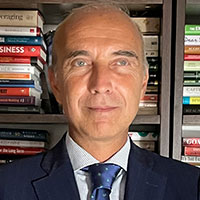 Mikel Navarro Mendizábal
Profesor
Professor
Licenciado en Ciencias Económicas por la Universidad Autónoma de Madrid, especializado en finanzas. Con más de 20 años de experiencia en mercados financieros ha desempeñado su carrera profesional fundamentalmente en Fortis - Beta Capital como bróker de renta variable, en Allianz Popular como gestor de fondos de inversión y pensiones y en Santalucía, primero como responsable corporativo de Renta Variable del Grupo y posteriormente liderando el equipo de Renta Variable en Santalucía AM. Actualmente lidera el equipo de renta variable, gestión activa, Europa en BBVA Asset Management.
Ha colaborado en distintos centros y en CUNEF impartiendo materia financiera.
Acredita los siguientes títulos: CFA, CAIA, CaD y CFA ESG.
Mikel Navarro Mendizábal
Profesor
Professor
Licenciado en Ciencias Económicas por la Universidad Autónoma de Madrid, especializado en finanzas. Con más de 20 años de experiencia en mercados financieros ha desempeñado su carrera profesional fundamentalmente en Fortis - Beta Capital como bróker de renta variable, en Allianz Popular como gestor de fondos de inversión y pensiones y en Santalucía, primero como responsable corporativo de Renta Variable del Grupo y posteriormente liderando el equipo de Renta Variable en Santalucía AM. Actualmente lidera el equipo de renta variable, gestión activa, Europa en BBVA Asset Management.
Ha colaborado en distintos centros y en CUNEF impartiendo materia financiera.
Acredita los siguientes títulos: CFA, CAIA, CaD y CFA ESG.
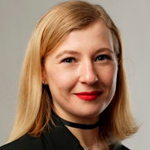 Elena Navrotskaya
Profesora
Professor
Licenciada en Periodismo por la Universidad Estatal de Moscú. Es máster en Publicidad y Empresa por la UBA, máster en Pensamiento Español e Iberoamericano por la UAM, máster en Formación del Profesorado por la Universidad Nebrija. Doctora en Estudios Hispánicos por la UAM (Mención Cum Laude). Cuenta con una amplia experiencia en el ámbito docente. Ha sido profesora de inglés y asignaturas relacionadas con historia y cultura durante muchos años, enseñando en centros de formación, academias y colegios. Cuenta con certificados oficiales que acreditan su maestría en dominio de inglés (CPE) y español (DELE C2) y sus habilidades profesionales (CELTA). Actualmente imparte asignaturas de grado y máster (Curricular Development in English, English Didactics, Organization of Bilingual Centres in Spain) en dos universidades. Está interesada en metodologías de enseñanza, literatura (está cursando el grado de Estudios Ingleses en la UNED) y música. Habla inglés, español, ruso y francés.
Elena Navrotskaya
Profesora
Professor
Licenciada en Periodismo por la Universidad Estatal de Moscú. Es máster en Publicidad y Empresa por la UBA, máster en Pensamiento Español e Iberoamericano por la UAM, máster en Formación del Profesorado por la Universidad Nebrija. Doctora en Estudios Hispánicos por la UAM (Mención Cum Laude). Cuenta con una amplia experiencia en el ámbito docente. Ha sido profesora de inglés y asignaturas relacionadas con historia y cultura durante muchos años, enseñando en centros de formación, academias y colegios. Cuenta con certificados oficiales que acreditan su maestría en dominio de inglés (CPE) y español (DELE C2) y sus habilidades profesionales (CELTA). Actualmente imparte asignaturas de grado y máster (Curricular Development in English, English Didactics, Organization of Bilingual Centres in Spain) en dos universidades. Está interesada en metodologías de enseñanza, literatura (está cursando el grado de Estudios Ingleses en la UNED) y música. Habla inglés, español, ruso y francés.
 Roberto A. Alessandro Piccini
Profesor
Professor
Ingeniero Superior en Electrónica por el Politecnico di Milano. Es Coach certificado por el CTI (Coaches Training Institute) y es acreditado en la metodología de Trabajo en Equipo de Belbin y en el cuestionario Myers Briggs Type Indicator. Actualmente es Consultor de Desarrollo del Talento, Director de proyectos de RRHH y Coach en su propia consultora Loremingenia. Ha sido Director de Desarrollo de RRHH en la Universidad Europea de Madrid, Consultor Senior de RRHH en Euroresearch S.A. y Talent Academy Manager en la multinacional canadiense Nortel Networks. Durante 10 años, ha sido Investigador y Director de Proyectos de I+D+i de la Comunidad Europea en la multinacional italiana de telecomunicaciones Italtel S.p.A. Es Profesor especialista en las áreas de Gestión de Personas, Liderazgo y Habilidades Directivas, impartiendo clases tanto a nivel de Grado como de Másters, a nivel nacional e internacional (Méjico, Colombia, Ecuador, República Dominicana).
Roberto A. Alessandro Piccini
Profesor
Professor
Ingeniero Superior en Electrónica por el Politecnico di Milano. Es Coach certificado por el CTI (Coaches Training Institute) y es acreditado en la metodología de Trabajo en Equipo de Belbin y en el cuestionario Myers Briggs Type Indicator. Actualmente es Consultor de Desarrollo del Talento, Director de proyectos de RRHH y Coach en su propia consultora Loremingenia. Ha sido Director de Desarrollo de RRHH en la Universidad Europea de Madrid, Consultor Senior de RRHH en Euroresearch S.A. y Talent Academy Manager en la multinacional canadiense Nortel Networks. Durante 10 años, ha sido Investigador y Director de Proyectos de I+D+i de la Comunidad Europea en la multinacional italiana de telecomunicaciones Italtel S.p.A. Es Profesor especialista en las áreas de Gestión de Personas, Liderazgo y Habilidades Directivas, impartiendo clases tanto a nivel de Grado como de Másters, a nivel nacional e internacional (Méjico, Colombia, Ecuador, República Dominicana).
 José Domingo Portero Lameiro
Profesor
Professor
Doctor por la Universidad de Cádiz y postdoctorado por la Universidad de Aveiro. Acreditado por la ANECA como Profesor Contratado Doctor. Miembro del Grupo de Investigación SEJ-058 “Cátedra de Estudios Jurídicos y Económicos Francisco Tomás y Valiente” del Plan Andaluz de I+D+i. También, es investigador del Centro de Investigaçâo Jurídico-Económico (CIJE) de la Universidad de Oporto. Y miembro de la Red Iberoamericana de Investigación “Relaciones intergubernamentales, gobierno multinivel y procesos supraestatales” de la Asociación Universitaria Iberoamericana de Postgrado (AUIP).
José Domingo Portero Lameiro
Profesor
Professor
Doctor por la Universidad de Cádiz y postdoctorado por la Universidad de Aveiro. Acreditado por la ANECA como Profesor Contratado Doctor. Miembro del Grupo de Investigación SEJ-058 “Cátedra de Estudios Jurídicos y Económicos Francisco Tomás y Valiente” del Plan Andaluz de I+D+i. También, es investigador del Centro de Investigaçâo Jurídico-Económico (CIJE) de la Universidad de Oporto. Y miembro de la Red Iberoamericana de Investigación “Relaciones intergubernamentales, gobierno multinivel y procesos supraestatales” de la Asociación Universitaria Iberoamericana de Postgrado (AUIP).
 Carlos Ramírez Triana
Profesor
Professor
Profesor de Análisis del Entorno Económico y Fundamentos de Economía, y Coordinador de Prácticas empresariales en ECNI en Nebrija. Carlos es economista y Magister en Ciencias Económicas de la Universidad Nacional de Colombia (con énfasis en Industria y Tecnología). Cuenta con un Doctorado en Management de la Macquarie University de Australia. Tiene una trayectoria en la academia por cerca de 20 años, en ambientes presenciales y virtuales. Se ha desempeñado como docente del área económica en cursos de grado en asignaturas como fundamentos, microeconomía, macroeconomía y econometría. Así mismo, en posgrado en asignaturas como Análisis de datos y Métodos Cuantitativos. Finalmente, como investigador, sus esfuerzos se han centrado principalmente de energía renovables e innovación en su país natal. Ha participado en diversos eventos y publicaciones desde su anterior cargo de coordinador de investigación de la Institución Universitaria Politécnico Grancolombiano y docente de varias universidades colombianas y de la Macquarie University.
Carlos Ramírez Triana
Profesor
Professor
Profesor de Análisis del Entorno Económico y Fundamentos de Economía, y Coordinador de Prácticas empresariales en ECNI en Nebrija. Carlos es economista y Magister en Ciencias Económicas de la Universidad Nacional de Colombia (con énfasis en Industria y Tecnología). Cuenta con un Doctorado en Management de la Macquarie University de Australia. Tiene una trayectoria en la academia por cerca de 20 años, en ambientes presenciales y virtuales. Se ha desempeñado como docente del área económica en cursos de grado en asignaturas como fundamentos, microeconomía, macroeconomía y econometría. Así mismo, en posgrado en asignaturas como Análisis de datos y Métodos Cuantitativos. Finalmente, como investigador, sus esfuerzos se han centrado principalmente de energía renovables e innovación en su país natal. Ha participado en diversos eventos y publicaciones desde su anterior cargo de coordinador de investigación de la Institución Universitaria Politécnico Grancolombiano y docente de varias universidades colombianas y de la Macquarie University.
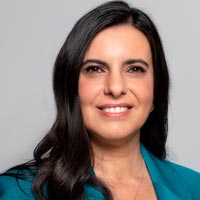 Barbara Licia Rey Actis
Profesora
Professor
Directora del MBA TECH en la Nebrija Business & Technology School y profesora de Emprendimiento y Marketing en la NBTS, la Universidad Antonio Nebrija -facultad de Economía y Empresa- y el Instituto Antonio Nebrija.
Doctoranda en la Escuela Internacional de Doctorado en la Universidad Rey Juan Carlos -Economía y Empresa- investiga sobre Economía de Longevidad.
MBA en Instituto de Empresa, graduada con Honores. Máster en Dirección de Marketing en la Universidad de San Andrés (Buenos Aires, Argentina) y Licenciada en Relaciones Humanas y Públicas en la Universidad de Morón (Buenos Aires, Argentina).
Consultora especializada en longevidad. Fundadora de Longevity Initiatives.
Autora de “Una longevidad con sentido” (Editorial Verssus) y coautora de “Un país para mayores” (Instituto Santalucía).
Profesional del marketing con más de 30 años de experiencia en compañías multinacionales.”
Barbara Licia Rey Actis
Profesora
Professor
Directora del MBA TECH en la Nebrija Business & Technology School y profesora de Emprendimiento y Marketing en la NBTS, la Universidad Antonio Nebrija -facultad de Economía y Empresa- y el Instituto Antonio Nebrija.
Doctoranda en la Escuela Internacional de Doctorado en la Universidad Rey Juan Carlos -Economía y Empresa- investiga sobre Economía de Longevidad.
MBA en Instituto de Empresa, graduada con Honores. Máster en Dirección de Marketing en la Universidad de San Andrés (Buenos Aires, Argentina) y Licenciada en Relaciones Humanas y Públicas en la Universidad de Morón (Buenos Aires, Argentina).
Consultora especializada en longevidad. Fundadora de Longevity Initiatives.
Autora de “Una longevidad con sentido” (Editorial Verssus) y coautora de “Un país para mayores” (Instituto Santalucía).
Profesional del marketing con más de 30 años de experiencia en compañías multinacionales.”
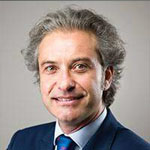 Fernando Tomé Bermejo
Profesor
Professor
Actualmente profesor del departamento de economía y empresa de la Universidad Nebrija
Entre 2015 y 2023: Vicerrector de estudiantes, empleabilidad e internacionalización, antes Decano y Vicedecano de la Facultad de Ciencias Sociales. Durante 2020 simultaneó el vicerrectorado con la dirección de la Fundación Antonio de Nebrija.
Ha sido Rector y Decano de IEDE Business School Chile, Director de IEDE Business School Madrid y de la Escuela Universitaria Real Madrid.
Profesor acreditado como contratado doctor en economía por ANECA. Desde 2001 ejerce ininterrumpidamente la docencia universitaria y lo ha hecho como miembro del claustro de cuatro universidades españolas, Universidad San Pablo CEU, Universidad de Alcalá, Universidad Europea de Madrid, Universidad Nebrija; y de dos extranjeras, Universidad Andrés Bello (Chile) y Universidad de las Américas de Ecuador.
Su ámbito de docencia e investigación es la teoría económica. En los últimos cinco años, ha escrito seis artículos científicos indexados, un libro, ha dirigido dos tesis doctorales y ha participado en nueve libros como director, coordinador y autor de capítulos. Su última publicación científica es de 2022, en la revista Cuadernos de economía (SJR). A nivel divulgativo, y en los últimos cuatro años, acumula más de veinticinco artículos periodísticos y su última publicación es de El País-Cinco Días. Participa habitualmente en las tertulias económicas como las de Intereconomía Radio, “A media sesión” y Capital Radio, “Mercado abierto”.
Es miembro de dos grupos de investigación, “Internacionalización de empresas" en la Facultad de Ciencias Sociales de la Universidad Nebrija y en el grupo OPINBI, consorcio de investigadores de cuatro universidades de la Comunidad de Madrid (Universidad Complutense, Universidad de Alcalá, Universidad Rey Juan Carlos y Universidad Nebrija) que investigan sobre oportunidades individuales, desigualdad económica y pobreza.
Profesor visitante o invitado en 15 universidades fuera de España. Su estancia internacional más extensa fue en Santiago de Chile, donde residió entre 2013 y 2015.
Fernando Tomé Bermejo
Profesor
Professor
Actualmente profesor del departamento de economía y empresa de la Universidad Nebrija
Entre 2015 y 2023: Vicerrector de estudiantes, empleabilidad e internacionalización, antes Decano y Vicedecano de la Facultad de Ciencias Sociales. Durante 2020 simultaneó el vicerrectorado con la dirección de la Fundación Antonio de Nebrija.
Ha sido Rector y Decano de IEDE Business School Chile, Director de IEDE Business School Madrid y de la Escuela Universitaria Real Madrid.
Profesor acreditado como contratado doctor en economía por ANECA. Desde 2001 ejerce ininterrumpidamente la docencia universitaria y lo ha hecho como miembro del claustro de cuatro universidades españolas, Universidad San Pablo CEU, Universidad de Alcalá, Universidad Europea de Madrid, Universidad Nebrija; y de dos extranjeras, Universidad Andrés Bello (Chile) y Universidad de las Américas de Ecuador.
Su ámbito de docencia e investigación es la teoría económica. En los últimos cinco años, ha escrito seis artículos científicos indexados, un libro, ha dirigido dos tesis doctorales y ha participado en nueve libros como director, coordinador y autor de capítulos. Su última publicación científica es de 2022, en la revista Cuadernos de economía (SJR). A nivel divulgativo, y en los últimos cuatro años, acumula más de veinticinco artículos periodísticos y su última publicación es de El País-Cinco Días. Participa habitualmente en las tertulias económicas como las de Intereconomía Radio, “A media sesión” y Capital Radio, “Mercado abierto”.
Es miembro de dos grupos de investigación, “Internacionalización de empresas" en la Facultad de Ciencias Sociales de la Universidad Nebrija y en el grupo OPINBI, consorcio de investigadores de cuatro universidades de la Comunidad de Madrid (Universidad Complutense, Universidad de Alcalá, Universidad Rey Juan Carlos y Universidad Nebrija) que investigan sobre oportunidades individuales, desigualdad económica y pobreza.
Profesor visitante o invitado en 15 universidades fuera de España. Su estancia internacional más extensa fue en Santiago de Chile, donde residió entre 2013 y 2015.
 Ulpiano J Vazquez Martinez
Profesor
Professor
Doctor por la Universidad Pontificia Comillas ICAI ICADE desde 2016. También obtuvo un Máster en Marketing y Ventas en ESIC Business & Marketing School y se Diplomó en Ciencias Empresariales en la Universidad de León. Ha realizado cursos de posgrado en Innovación y Emprendimiento en el Massachusetts Institute of Technology (MIT) y sobre Management en la London School of Economics and Political Science (LSE).
Es profesor de innovación y emprendimiento en la UE desde 2019. Aplica diferentes metodologías de enseñanza para fomentar la participación de los alumnos durante el curso, como casos de negocios, debates o aulas invertidas, entre otras. Es profesor visitante habitual en otras instituciones internacionales en Perú, México, Estados Unidos y Líbano. Ha investigado extensamente sobre Gastronomía y Place Branding, publicando en revistas académicas y participando en varios congresos internacionales. Antes de unirse a la academia en 2016, el Dr. Vázquez trabajó para varias empresas y vivió en entornos multiculturales y diferentes países como España, Reino Unido, Francia y Perú. Aún compagina su actividad académica con la práctica de la consultoría de empresas. Habla español, inglés y francés con fluidez.
Ulpiano J Vazquez Martinez
Profesor
Professor
Doctor por la Universidad Pontificia Comillas ICAI ICADE desde 2016. También obtuvo un Máster en Marketing y Ventas en ESIC Business & Marketing School y se Diplomó en Ciencias Empresariales en la Universidad de León. Ha realizado cursos de posgrado en Innovación y Emprendimiento en el Massachusetts Institute of Technology (MIT) y sobre Management en la London School of Economics and Political Science (LSE).
Es profesor de innovación y emprendimiento en la UE desde 2019. Aplica diferentes metodologías de enseñanza para fomentar la participación de los alumnos durante el curso, como casos de negocios, debates o aulas invertidas, entre otras. Es profesor visitante habitual en otras instituciones internacionales en Perú, México, Estados Unidos y Líbano. Ha investigado extensamente sobre Gastronomía y Place Branding, publicando en revistas académicas y participando en varios congresos internacionales. Antes de unirse a la academia en 2016, el Dr. Vázquez trabajó para varias empresas y vivió en entornos multiculturales y diferentes países como España, Reino Unido, Francia y Perú. Aún compagina su actividad académica con la práctica de la consultoría de empresas. Habla español, inglés y francés con fluidez.
More Academic Information
Official Degree:Bachelor's Degree in Business Creation, Administration and Management
Those interested in studying and obtaining the degree in C-ADE from Antonio de Nebrija University are usually, in their majority, students who have recently finished the baccalaureate or high school studies. However, there are also many cases of those who come from the 2nd Degree Vocational Training or who are graduates in Business Studies or another degree similar to the Degree in Business Creation, Administration and Management.
Therefore, in addition to the students with a baccalaureate degree, it also includes as an entry profile the graduates of 2nd Degree Vocational Training of the Administrative and Commercial branch, equated to the Higher Technicians by Royal Decree 778/1998 of April 30. In particular, but not exclusively, Commercial Specialists are included in this profile, equated to the graduates of 2nd Degree Vocational Training of the Administrative and Commercial branch, by Royal Decree 265/1979 of January 26, in its 1st Additional Provision and also the Specialist Technicians, of the administrative and commercial branch, whose degree, according to Organic Law 2/2006 of May 3, of Education, in its 31st Additional Provision, has the same academic and professional effects as the degree of Higher Technician in the respective specialty.
In general, the student must:
- Show interest in the world of economics and business.
- Have some ability with mathematics and accounting.
- Be interested in social and political issues.
- Be sociable.
- Possess the ability to express oneself.
- Be able to analyze and synthesize.
- Possess ease of understanding and abstraction.
- Have a broad view of the world.
- Show ambition, initiative and proactivity in their daily work.
Future graduates will be able to identify themselves with the professional profiles of Business Administration or Management, Business and Economic Consulting, Foreign Trade, International Organizations, Study and Planning Services, Taxation, and Teaching and Research.
240 ECTS credits.
Basic education Credits (BS): 60
Compulsory Credits (C): 156
Elective Credits (EL): 12
External internship Credits: 6
Final Research Project Credits: 6
TOTAL ECTS CREDITS: 240
Minimum number of ECTS by type of enrollment and course
Full-time students: Minimum number of ECTS: 45 - Maximum number of ECTS: 90
Part-time students: Minimum number of ECTS: 12 - Maximum number of ECTS: 45
Center responsible:School of Economics and Business
Branch of knowledge: Social and Legal Sciences
Available places: Total Openings: 180
- In the first year of implementation:
- Classroom attendance: 90
- Online: 90
- In the rest of the years:
- Classroom attendance: 135
- Online: 45
Type of Education:
Academic year in which it was implemented: ADE: 2009/2010
Last modified: January 2022
Languages: Spanish / English
University Services: [+info]
Competences
Basic Competences- BC1.- Students demonstrate to possess and understand knowledge in an area of study that starts from the base of general secondary education, and is usually found at a level that, although supported by advanced textbooks, also includes some aspects that imply knowledge coming from the forefront of his/her field of study.
- BC2.- Students know how to apply their knowledge to their work or vocation in a professional manner and possess the skills that are usually demonstrated through the elaboration and defense of arguments and the resolution of problems within their area of study.
- BC3.- Students have the ability to gather and interpret relevant data (usually within their area of study) to make judgments that include a reflection on relevant issues of social, scientific or ethical nature.
- BC4.- Students can transmit information, ideas, problems and solutions to a specialized and non-specialized public.
- BC5.- Students develop those learning skills necessary to undertake further studies with a high degree of autonomy.
- GC1.- Ability to resolve problems.
- GC2.- Ability to analyze and summarize.
- GC3.- Ability for organization and planning.
- GC4.- Ability to analyze and search for information from various sources.
- GC5.- Ability to make decisions.
- GC6.- Ability to transfer knowledge.
- GC7.- Ethical commitment at work.
- GC8.- Ability to work in a team.
- GC9.- Ability to work in stressful environments.
- GC10.- Motivation for quality.
- GC11.- Ability to adapt to new situations.
- GC12.- Ability to apply knowledge in practice.
- GC13.- Ability to search for information and research.
- GC14.- Ability to design and manage projects.
- GC15.- Be fluent in the basic economic terminology and use it in the appropriate contexts.
- GC16.- Acquire the ability to apply theoretical knowledge to problems of everyday life.
- GC17.- Learn the interpretation of case studies, motivated in cases and news from the models studied.
- GC18.- Ability to search and use statistical sources that provide useful economic information to model the individual behavior of economic agents.
- GC19.- Be able to apply the appropriate mathematical knowledge to each business situation and properly interpret the results.
- GC20.- Prepare arguments to guide decision-making based on statistical-econometric analysis.
- GC21.- Teach the student to situate the state of the question about a specific problem in the economic literature, as well as to decide the appropriate econometric tools to contribute to its solution.
- GC22.- Be able to develop arguments that guide decision-making based on the territorial analysis carried out and the global comprehension in its different scales of observed phenomena.
- SC1.- Choose the appropriate techniques, tools and models in the analysis of different economic problems.
- SC2.- Use specific computer programs of the sector, and Interpret the results obtained through them.
- SC3.- Understand the terms and concepts related to mathematics and statistical techniques that allow the best possible diagnosis and decision process.
- SC4.- Appreciate the value of quantitative methods as necessary tools for the development of other disciplines.
- SC5.- Awareness of the importance of data analysis for decision-making.
- SC6.- Appreciate the value of accounting methods as necessary tools for the development of other disciplines.
- SC7.- Carry out activities aimed at the applicability of theoretical, methodological and technical knowledge acquired by working as a team and developing skills and abilities of a professional of this profile of studies.
- SC8.- Know and identify economic transactions as well as learn to register them.
- SC9.- Know correctly the calculation of the Benefits and the preparation of the synthesis information (Balance and Profit and Loss Account, cash flow statement) and the annual report.
- SC10.- Know the cost systems of organizations.
- SC11.- Habitually use information technology and communications in all their professional capacity.
- SC12.- Know the organizational and structural models of the modern company.
- SC13.- Know the directive functions, and styles and direction models.
- SC14.- Learn the techniques of strategic analysis of the company in its competitive environment.
- SC15.- Manage a company or organization of small size, understanding its competitive and institutional location and identifying its strengths and weaknesses.
- SC16.- Solve management and administration problems.
- SC17.- Assess, based on the relevant information records, the situation and foreseeable evolution of a company.
- SC18.- Issue advisory reports on specific situations of companies and markets.
- SC19.- Apply directive and leadership skills, such as teamwork, motivation of people and talent management.
- SC20.- Value the importance of economic analysis as an instrument to understand the functioning of the economy and the resolution of socio-economic problems.
- SC21.- Identify and anticipate financing opportunities.
- SC22.- Organize the information provided by the national and international market.
- SC23.- Select the information to make optimal decisions for the analysis of operations in real assets and in financial assets.
- SC24.- Understand the financial operations that take place in the business environment, as well as the design and analysis of investment and financing strategies.
- SC25.- Understand the different manifestations of law in its historical evolution and its current reality.
- SC26.- Search for information, documentation and legal reference sources on computer bases.
- SC27.- Have an ethical behavior in business.
- SC28.- Put into practice and develop the theoretical / technical knowledge acquired in their studies, facing real problems and making decisions.
- SC29.- Verify the acquisition by the student of the general and specific competencies of the degree.
- SC30.- Define criteria according to which a company is defined and relate the results with the analysis of the environment to identify perspectives.
- SC31.- Identify new developments of business organizations to successfully face the changing environment.
- SC32.- Understand the details of business functions, types of business activities, geographical regions, size of companies, business sectors and relate them to basic knowledge.
- SC33.- Possess psychological and sociological sensitivity to detect emerging trends and changes in society and the environment.
- SC34.- Be able to establish realistic goals and achieve them.
- SC35.- Use creativity and innovation to find solutions to problems.
- SC36.- Apply a practical and coherent methodology to make adequate organizational designs.
- SC37.- Acquire skills for resource management, customer orientation, interlocution and strategic negotiation ability, as well as the ability for reaction and development of agile and effective corrective actions.
- SC38.- Develop their capacity to transmit information, problems, ideas and solutions, acquiring oral and written communication skills.
- SC39.- Acquire skills and master computer tools applied to different subjects
- SC40.- Understand the different manifestations of law in its historical evolution and in its current reality.
- SC41.- Learn to learn: identify when, how and where it is necessary to acquire new knowledge and skills in the field of administration and business management.
- SC42.- Ability to establish working hypotheses and carry out studies and research through various methods and techniques that confirm or not the initial hypothesis.
- SC43.- Have critical and self-critical capacity.
- SC44.- Put into practice and develop the theoretical / technical knowledge acquired in their studies, facing problems and making real decisions.
- SC45- Acquire the necessary professional skills and competences in a real work environment: team work, communication with business agents, etc.
- SC46.- Develop personal skills. Increase in maturity for later.
- periods of learning and their concern for their professional future. Ability to enter the labor market, as a worker or as an entrepreneur.
- SC47.- Define criteria with which to identify a company and relate the results with the analysis of the environment to design business strategies.
- SC48.- Analyze and structure a business problem and design a solution.
- SC49.- Identify and use appropriate software.
- SC50.- Audit an organization and design a consultancy plan.
- SC51.- Identify cultural and ethical issues and understand their impact on the company.
- SC52.- Know and understand the way in which relations with consumers take place in the interactive digital environment, as well as the potential of the Internet as a source of information and knowledge about the consumer.
- SC53.- Be able to implement actions and campaigns of communication, advertising and online marketing based on objectives and strategies.
Online Studies
Metodology
Metodology
In the Bachelor's Degree in C-ADE - Business Creation, Administration and Management, the methodology used involves a student-based teaching/learning process, which encourages active participation and favors the development of general and specific competencies that demonstrate knowledge, skills and attitudes applicable in a future professional career.
The distance learning methodology of Nebrija University focuses its efforts on the interaction with students. This commitment is concreted in the encouragement of cooperative learning, the simulation of real situations and the resolution of problems and the case method. All this with the support of the latest-generation technological tools, which serve as a support:
- Collaborative work (teacher-student, student-student) with the use of forums, chats, videoconferences, etc.
- Continuous monitoring of the student's performance with the different work tools offered by the control panel.
The educational actions are carried out in Lectures divided in content blocks and the use of videoconferences; these are complemented by learning activities, outside the lecture session through forums and chats, which encourage self-learning and critical reflection; and Tutorials where the professors are in charge of guiding and assisting the students in a personalized way, one of the hallmarks of Nebrija University.
All these techniques assume that the student takes on an active role in his/her academic training. In addition, the work of the teacher acquires a guiding dimension of support and orientation, which must be consistent with a transparent and formative evaluation system that faithfully reflects the knowledge and skills acquired.
Educational activities
The educational activities of this Bachelor's Degree in its distance learning option contain the following elements:
AF1. Distance theoretical classes
The students have online work sessions, which share some aspects with the lecture classes and in others they are differentiated by their own nature.
The subjects in which the studying has more weight in the virtual campus have a developed EDUCATIONAL ITINERARY, in which the units of the program are outlined. The structure of the Itinerary is hypertextual, as it has content Blocks, which are divided into Units. In each of these units a complete lesson is described; it refers to other related lessons which say, explain or present through hyperlinks; complementary information is added on concepts, definitions, bibliography, sales and connections with the Documentation Center of the subject. The teacher can also teach a master class using the VIDEOCONFERENCE system.
The biggest difference between the master classes and doing the content units on the platform, other than class attendance, is the chronological sequence, since the student can connect to the platform for as long as he/she wishes, at the time he/she wishes; they can interrupt their work when they want, they can interact with the platform itself, using all forms of hypertextuality and connections to Internet sources through the documentation center. They can also interact with their classmates and with teachers through the FORUMS, to ask questions or comment on some content; or in a more conventional type of learning, they can print all the material of the unit and read it wherever they want.
The virtual Campus of each subject also allows the professor to explain all kinds of documents, labeled, in the DOCUMENTS folder, with contents of the subject, in PDF, Power Point, videos and audios formats, which set forth the contents of the subject that is being taught, they provide examples and provide more information.
The academic Forum of each subject allows to build theoretical and practical knowledge through the interaction of students with different groupings. There is the General Forum, in which all the students and the teacher participate, and the Group Forum, in which the students work in small groups, always organized by the teacher and supervised by the latter, in which the members of the group -and only them- can share documents of all types.
AF2. Remote case studies
The practical cases in the online mode will be carried out using the Virtual Campus. The professor will post the case and/or exercises that the students must complete in the DOCUMENTS folder, and these will be delivered through the task mailbox for correction by the teacher. There is a specific Forum for the discussion of the relevant issues of the case by all the students and the professor, and Debates will be held through the forum.
The professors are responsible for guiding and assisting students in organizational and didactic difficulties, paying special attention to personalized advice on the skills and competencies they must carry out to complete the academic work outside of classroom lectures. They try to create a space designed to listen and advise students about topics that are of concern, a quiet environment, free of interruptions that encourages dialogue.
AF3. Remote reading and analysis of texts
The professor, as in the previous case, will post the required reading texts in the Documents folder, and the students will have to analyze them according to the same methodology as in the work described below.
AF4. Remote tutorials
The personalized nature of teaching at Nebrija University is based on the deep belief that teaching is not reduced to mere instruction. In this sense, the professor is not only a transmitter of knowledge but an educator who guides and assists students in their needs, needs that are not limited to the acquisition of concepts but also to the development of procedures and attitudes. The tutorials are provided by the professors of the subjects.
The professors are responsible for guiding and assisting students in organizational and didactic difficulties, paying special attention to personalized advice on the skills and competencies they must carry out to complete the academic work outside of classroom lectures. They try to create a space designed to listen and advise students about topics that are of concern, a quiet environment, free of interruptions that encourages dialogue.
In its distance learning modality, in the Virtual Campus there will be a tutorial site, through which students can raise their questions to the professor of the subject, who will respond through the same channel.
In the same way, five mechanisms of assistance to the student in tutorials are implemented.
- The academic forums of each subject, moderated by the professor, with the participation of all the students, where they can consult and share questions of the students and answers by the professor.
- Individual email between student and professor, for individual clarifications.
- Telephone tutoring at a pre-scheduled time for each subject.
- Remote tutoring using tools such as Skype that allow direct visualization between professor and student or visualization of documents.
- Obviously, students who wish to do so and can travel, may arrange a personal face-to-face tutoring with the professor at the Nebrija University Campus.
AF5. Projects through virtual resources
The discussion of the specific aspects of these projects is carried out in the "Forums" section, in which the students debate about these cases, as well as related topics that the professor thinks appropriate to raise.
The exposition, by the individual or in groups, is presented by the students through the Task Mailbox and/or through videoconference. Each subject has its own space in the Virtual Campus, which allows to share documentation and images, and hold debates by real-time videoconference.
At the same time, in the PROJECTS tool, the professor and the students can share the work that everyone carries out, once they have been commented and evaluated by the professor, so cooperative learning is made accessible: everything that each student does can be available to the entire class, if the professor deems it convenient.
AF6. Individual and / or team work of the students
This educational activity is exactly the same as in the classroom attendance modality, and consists of the student having to carry out by himself/herself (or in a group) the reading of articles, notes, as well as the cases and individual projects (or in groups) that are required. These projects are reflected in the evaluation system regarding ECTS credits.
AF7. Complementary education actions
Seminars, specialized conferences and congresses on topics related to the areas of knowledge.
AF8. Activities of professional internships
The students will carry out internships of a duration equivalent to 18 ECTS from the 6th semester in companies with which the university has agreements. The students will perform the tasks that are assigned by the tutor responsible for their follow-up in the institution in which the internships are carried out. These education activities will be supervised by the tutor of the University, who will be responsible, in coordination with the tutor of the center and the student in question, to evaluate their process of professional and personal evolution in the internship center. The practical activities will always be performed in person, in the institution in which they are carried out. However, all will be followed by periodic tutorials, with the person in charge of the follow-up, at the university, or virtual, through communication by e-mail, video conference or Skype.
AF9. Preparation, presentation and defense of the Final Research Project
Development of an academic project of 18 ECTS credits on any of the topics proposed by the Department. Due to the entrepreneurial approach of the degree in C-ADE, the Final Research Project requires the elaboration of a Business Plan. However, the student may also opt for a EDP aimed at research in entrepreneurship, internationalization and/or family business, which are research lines of the department.
Grading system
The grading system of the distance learning modality does not change significantly with respect to the classroom modality, in the sense that the same educational activities are evaluated, although in its remote option.
In this way, the evaluation procedures for the distance learning modality are:
- Participation in remote forums, chats, blogs and other collaborative media, and remote participation in the classroom sessions.
- Preparation of individual and group work.
- Evaluation of complementary readings.
- Solving of practical cases.
- Remote and face-to-face written tests: there are two types of written distance tests:
- a) Self-assessment test. These self-assessment tests will also be implemented on the distance learning platform so that the student can repeat them and see the score obtained as many times as he/she wishes.
- b) Knowledge exam: Longer than the tests and evaluated by the professor. The results will be published on the platform after a certain time.
The exams or final exercises of each subject will always be performed in person.
In the final grade of the subject, the grade of said final exam is weighted with the rest of the assessment elements, with variable percentages of weighting of the different concepts, depending on the specific contents of the subject. The specific percentages of weighting in each subject appear in the documentation delivered to the student at the beginning of the course.
All grades will be accessible through the Internet, in the student's private section.
Grading examples:
Subject: Applied statistics
Grading system:
- Class participation, remote forums and other collaborative resources: 10%
- Group and individual projects: 20%
- Mid-term written tests: 10%
- In-person final exam: 50%
Calendar and schedules
Academic calendar 24-25 Schedules first semester 24-25 Schedules second semester 24-25Admission criteria
The admission process consists of several phases:
1. Submitting documentation
In order to apply for admission to the University, students must submit the admission application form to the Promotion and Admissions Department with the following documentation.
- Photocopy of Academic Record.
- Photocopy of DNI or passport.
- Two passport-size photographs.
- Although it is not a mandatory document, a letter of introduction from a teacher / tutor from the center of origin is recommended.
2. Taking Admission exams
All the candidates to the degree, in any of its teaching modalities, will take the Admission exams through the BlackBoard (BB) platform so that the candidate can receive the answer to their application quickly.
Admission exams are configured as an effective complement to know the initial situation of the student and to adapt their work rhythm to this situation, as well as to detect their specific education needs. The duration of the exams is approximately two and a half hours, and are carried out according to the profile of the candidate, and consists of two tests, in addition to the evaluation of the academic record and the report of the personal interview.
- 1. Assessment and evaluation of the student’s Academic Record.
- 2. Specific test:
It is a multiple-choice test and consists mainly of specific contents of some of the main areas of general knowledge that are to be studied in the degree chosen by the candidate, as well as other elements common to all the degrees. - 3. English test:
Its objective is to check the level of knowledge of the future student. Although there is no minimum level of exclusion, it is advisable to have at least an A2 level, however the test establishes the starting level in the subject. The test will be designed with multiple-choice questions, so that correction can be automatic. - 4.- Personal interview:
- 1. In the case of candidates coming to our campus, the personal interview will be performed by a professor of the School that holds the studies the candidate wishes to study.
- 2. In the case of candidates that take the Admission exams in centers outside of Madrid, the interview will be performed by academic consultants of the DDU.
- 3. In the case of the candidates that take the Admission exams without going to any of our centers in Madrid or the provinces, a professor of the School will perform the interview by telephone or videoconference.
If the number of students is over the maximum number of places available, student admission will be decided according to the following deliberation:
- 1. Assessment and evaluation of the student’s Academic Record: 40%.
- 2. Specific test: 20%
- 3. English test: 20%
- 4. Personal interview: 20%
In order to carry out the deliberation, each of the previous criteria will be evaluated from 1 to 10 before making the weighted sum.
All the tests will be automatically corrected by BlackBoard and the results will be sent to the Promotion and Admissions Department, in addition to the personal interview report that is completed once the interview is finished, and it is sent to the Promotion and Admissions Department.
Once the profile of each candidate has been assessed and studied and the Admission exams have been passed, the candidate is informed of his/her admission, in such a way that the student can begin to formalize his/her Enrollment.
Employability
Career Opportunities
Management positions in large national and international companies, such as Airbus, Repsol or BBVA , are the natural outlet for many of our graduates. Finance, marketing, management control or human resources are some of the functions to be carried out at the end of the studies.
The world of international organizations is another field that greatly interests our students. These institutions, both European and international, increasingly require a type of professional open to the world and with an international mindset.
Another professional opportunity in high demand is the higher bodies of the Spanish State Administration, in addition to continuing studies to start a teaching or research career.
Nebrija University always encourages entrepreneurship in all of its study plans, so creating a company is another natural outlet for graduates.
Internships
Companies collaborating with Nebrija University in terms of internships Action procedure in carrying out external practices Labor insertion survey report More Information of InternshipsEmployability recognized in the Rankings
The commitment of Nebrija University to the academic requirement, training in leading companies and institutions, innovation in multidisciplinary programs and international projection, places the University in the top positions of the most important rankings.
The International Ranking QS Stars awards Nebrija University the maximum score in the quality and satisfaction of students in teaching, employability of the graduates and the internationalization of the institution.
The national rankings also recognize Nebrija University as the first Spanish university in teaching and second in employability, highlighting its performance in research, knowledge transfer and internationalization.
The Bologna Declaration formalized the principles on which the European Higher Education Area should be based: quality, mobility, diversity, competitiveness and employment growth.
From this, Nebrija stands as an academic model of reference, educating students with excellent individual behavior, interaction with their environment and motivated by and for constant and continuous training. The Nebrija Institute of Professional Skills works every day to achieve the differentiation of our students through the development of attitudes and skills.
The main objective is for students to achieve the best of themselves through the development and empowerment of their personal skills and resources through personal self-knowledge.
In addition, some of the professional skills that are worked on within the three seminars are those related to interpersonal skills and active communication skills and negotiation, indispensable for our students to know how to transmit ideas, to argue them, to provide information and opinions in an adequate, clear and convincing way.
Within what will be their work performance, other aspects such as teamwork, conflict resolution and project management ability will be worked on.
In the third block, skills worked on are those aimed at increasing the student's employability. They will work with tools and techniques for job searching, and perform tasks that achieve in the student a greater use of their personal skills.
For all this we have currently active experts in selection of people, professionals dedicated to personal and professional training and professionals dedicated to the world of communication and the arts.
In this way, and in a complementary way to his/her specific training, we help the student create a differentiating pattern in the social and business environment in which he/she will be immersed when he/she finishes his/her studies.
International
The International Mobility Office of Nebrija University makes a constant effort to monitor the agreements with the most prestigious universities.
Business Creation, Administration and Management students can study at the following foreign universities, among which stand out:
NOTE: The destination universities, offered by degree, may vary according to the International Mobility Program. For more information, students can consult the information online in the International Mobility Program.
Several universities have special academic or linguistic requirements. For more information, consult the Department of International Programs.
* ERASMUS scholarship not available for Switzerland but to date, another scholarship has been awarded by the host university. Consult The International Mobility Office for more information.
University Life in ADE
Visit all the Activities of the School of Economics and Business
Nebrija Entrepreneurial Ecosystem
International Marketing Week
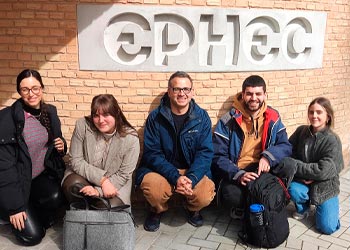
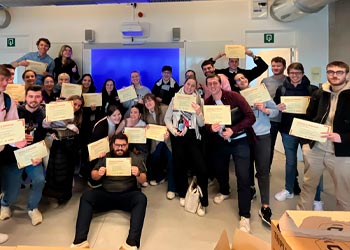
Click to expand
Nebrija University's School of Economics and Business took part in International Marketing Week, organized by the École Pratique des Hautes Études Commerciales (EPHEC) in Leuven, Belgium.
The event featured a competition focused on improving the Customer Journey for a real company: Bertinchamps, a local Belgian brewery.
Students from various European universities participated, attending lectures and coaching sessions while developing their teamwork and entrepreneurial skills in a dynamic, hands-on environment.
Young Entrepreneurs Competition
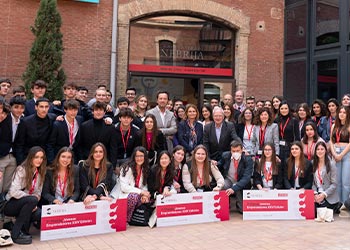
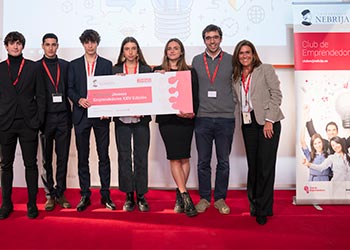
Click to expand
This competition offers pre-university students the chance to showcase their entrepreneurial skills, creativity, organization, and enthusiasm by defining and developing a business creation project.
Read +From generating an idea and developing a business plan to evaluating investment options and presenting the project to a panel of experts—participants face a series of real-world challenges that test and strengthen their entrepreneurial mindset.
Now in its 25th edition, the competition’s main goal is to foster an entrepreneurial spirit and promote innovation among Spanish high school and vocational training students.
Read LessScreensor Tech: How a Class Project Became a Real Company
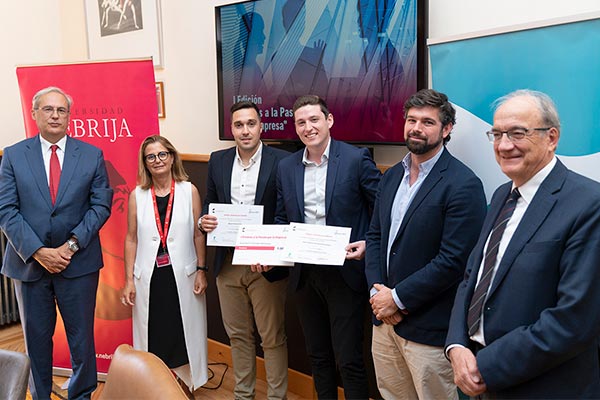
Lo que nació como una idea disruptiva en una clase de la Facultad de Economía y Empresa se ha convertido en una de las empresas más innovadoras de España que, actualmente, cuenta como partner a la multinacional LGWhat started as a disruptive idea in a classroom at Nebrija University’s School of Economics and Business has evolved into one of the most innovative companies in Spain, Screensor Tech, now partnered with multinational giant LG.
Read +From public transportation to retail environments, Screensor Tech delivers a new kind of user experience through transparent T-OLED screens that display real-time content and information. These screens can be installed on subways, buses, trams, in shopping centers, or on outdoor displays, transforming everyday spaces into dynamic platforms for brand communication and audience engagement.
Read LessSantander Explorer
Banco Santander, in collaboration with the Santander International Entrepreneurship Center (CISE) and Nebrija University, launches the 15th edition of the Explorer program, aimed at fostering young entrepreneurship and turning ideas into viable projects and solutions.
Read +Following its initial success in Spain, the program has expanded with strong participation across Latin America, including Argentina, Chile, Mexico, and Brazil.
The Explorer international community thrives through Q&A sessions with experts, engagement with alumni, and interactions on social platforms. Participants gain insight into key topics such as business model validation, financial forecasting, landing page design, and pitch development. The program also offers opportunities to discuss entrepreneurship and present ideas directly to startup founders and internationally recognized professionals.
Read LessCo-Working Space
A dedicated networking space where students can connect with peers and alumni who are in the process of launching or developing their own business ventures. It is a place to exchange ideas, experiences, and information, fostering collaboration among aspiring entrepreneurs.
Read +This space also serves as a forum and meeting point for students looking to build cross-functional teams and share their passion for entrepreneurship. Nebrija University becomes both a hub and a launchpad for innovation, offering a supportive environment for entrepreneurial initiatives.
Read LessEntrepreneurs Club
A cross-disciplinary initiative open to all Nebrija University students, with particular relevance for those in the School of Economics and Business.
Read +The Entrepreneurs Club runs throughout the academic year and offers a variety of engaging, hands-on activities:
- a) Internal sessions , led by Nebrija faculty, exploring entrepreneurship from a 360º perspective. These sessions cover key topics such as the business environment (including legislation and other external factors), financing, and marketing strategies.
- b) Conferences and workshops featuring entrepreneurs from a range of industries and business sizes, offering real-world insights and inspiration.
- c) Visits to companies and major entrepreneurship events, providing firsthand exposure to the startup ecosystem and opportunities for networking.
“The Adventure of Entrepreneurship” Series
Once a month, a renowned entrepreneur visits the university to share their journey and engage in an open discussion with students. These sessions offer a unique opportunity—especially for students from the School of Economics and Business—to learn directly from the real-world experiences of successful founders, gaining inspiration and practical insight into the entrepreneurial path.
Entrepreneurship Lab
The School offers a dedicated Entrepreneurship Lab to support students and alumni interested in launching their own ventures. The Lab provides two tailored programs:
- a) From Idea to Project: Open exclusively to current students from any faculty at Nebrija University.
- b) From Project to Market: Designed for those who have completed the previous stage, as well as Nebrija alumni and external entrepreneurial projects.
Participants in either program have access to a range of valuable resources and support services, including:
- Ongoing guidance from specialized mentors throughout the process.
- Legal support through the Legal Clinic of the Faculty of Law and International Relations.
- Administrative and regulatory advice.
- Information on microcredits, grants, and financing opportunities.
- Investor pitch preparation to support participation in funding rounds.
International Entrepreneurship Week
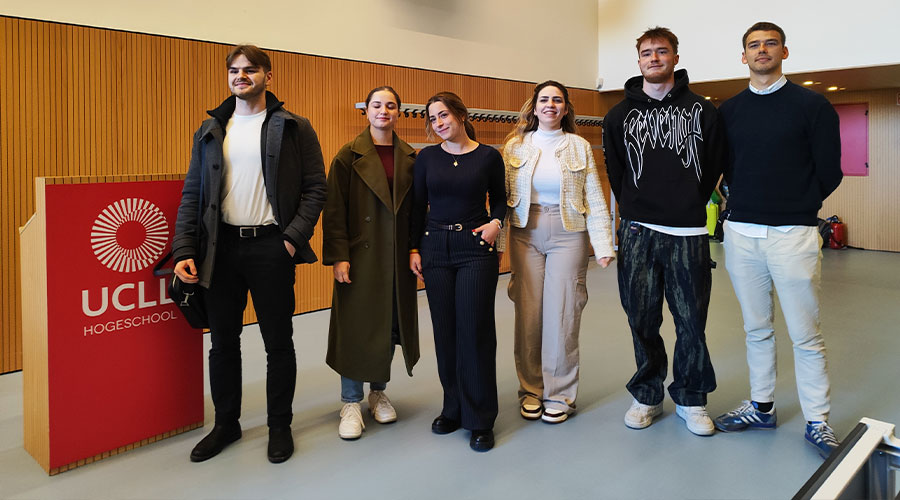
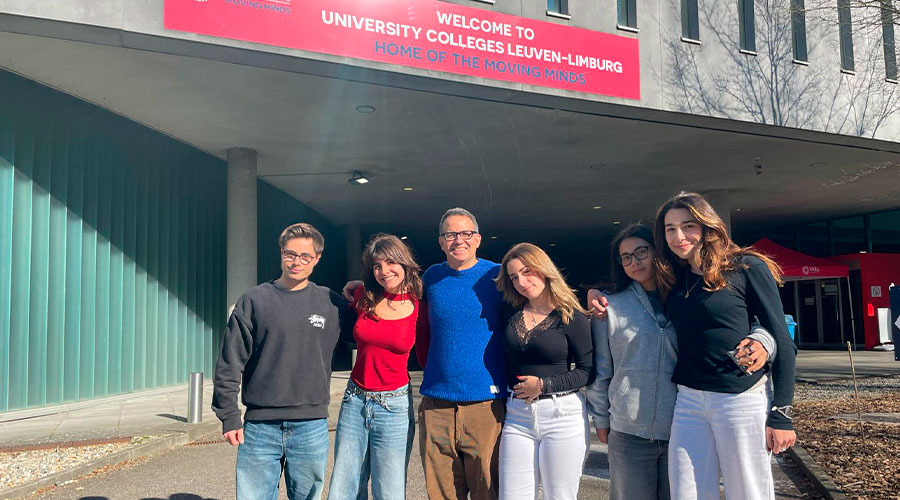
Click expand
The School of Economics and Business participated in the International Entrepreneurship Week at University College Leuven-Limburg (UCLL) in Leuven, Belgium. Representing Nebrija University were students Mireya Hernández Pérez, Irene de la Rosa Ceballos, Tobias Held, Lucia D'Antonio Fernández, and Lidia Alarcón Santos. As in the previous academic year, Nebrija was once again among the winners of the International Week. This year, participants worked on a real-life case study: developing a social media strategy for the Belgian clothing company Cosh.
Universities from Belgium, the United Kingdom, France, Ukraine, Germany, Italy, and Romania also took part in the competition. The students were accompanied by Professor Jorge Hernando from the School of Economics and Business. Congratulations to our students for their outstanding performance in this competition.



